Smart Home Automation
What Is the Difference Between Home Security and Home Automation?
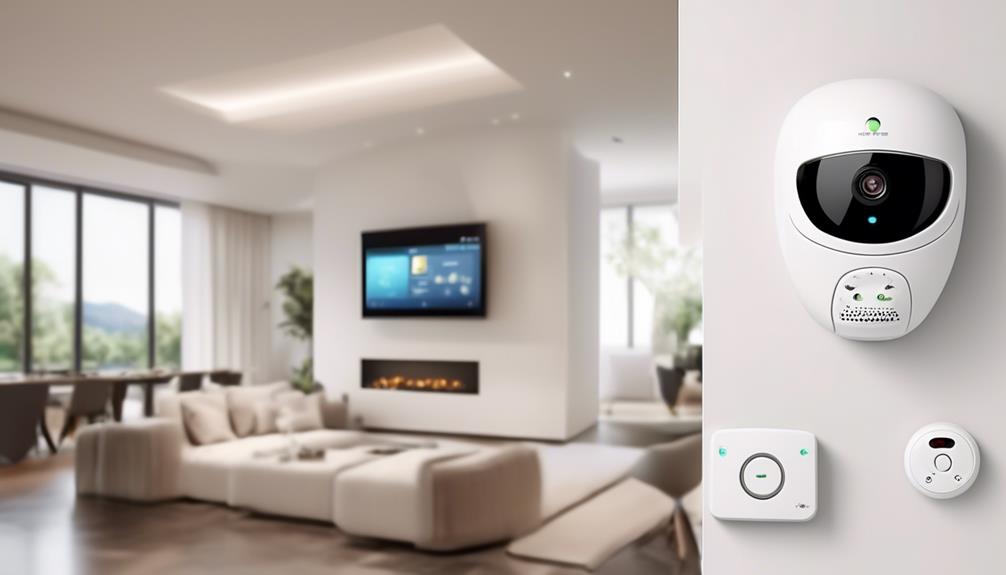
It might not be apparent to you that there is a difference between home security and home automation.
Many people tend to use these terms interchangeably, but they actually serve different purposes.
Home security focuses on safeguarding your home from intruders and potential threats, while home automation involves the use of technology to streamline and enhance various aspects of your home, such as lighting, temperature control, and entertainment systems.
Understanding the differences between these two can help you make informed decisions about how to best protect and improve your home.
Key Takeaways
- Home security focuses on safeguarding your home from intruders and potential threats, while home automation involves the integration of smart technologies to control and manage various aspects of the home environment.
- Home security systems include features such as sensors, cameras, and professional monitoring services to protect against intruders and emergencies, while home automation systems offer monitoring and remote control of various home systems.
- Home security primarily focuses on safety and monitoring, while home automation emphasizes technology integration and convenience.
- Benefits of home security systems include enhanced safety and peace of mind through 24/7 monitoring, remote access for monitoring the property from anywhere, motion detection and smart integration for enhanced security measures, and the potential for insurance discounts.
Understanding Home Security
Understanding home security involves assessing potential vulnerabilities and implementing measures to protect against unauthorized access and intrusions. Security features such as robust door locks, window sensors, motion-activated lights, and security cameras are essential components of a comprehensive home security system. These features act as deterrents and provide real-time alerts, enabling us to respond promptly to any potential security breaches.
When it comes to monitoring options, modern home security systems offer a range of choices to suit individual needs. Some systems provide self-monitoring through smartphone apps, allowing us to keep an eye on our homes from anywhere. Professional monitoring services are also available, offering 24/7 surveillance and immediate response to any security alerts. These monitoring options provide peace of mind, knowing that our homes are being watched over even when we're not physically present.
Exploring Home Automation

We are now delving into the realm of home automation, which encompasses the integration of smart technologies to control and manage various aspects of the home environment.
Smart devices, such as thermostats, lighting systems, and security cameras, can be connected to a central hub or controlled via a smartphone, allowing for remote control and automation of these devices.
One of the key benefits of home automation is the enhancement of energy efficiency. For example, smart thermostats can learn your temperature preferences and adjust settings to conserve energy when you're away. This not only reduces energy consumption but also leads to cost savings on utility bills.
Additionally, home automation provides unparalleled convenience. You can remotely monitor and control various aspects of your home, such as adjusting the temperature, turning lights on or off, and even locking doors, all from the convenience of your smartphone.
This level of control and automation not only simplifies daily tasks but also provides peace of mind, knowing that your home is just a tap away.
Key Differences Between the Two
When comparing home security and home automation, it's important to understand the distinct features that set them apart.
Home security primarily focuses on safety and monitoring, while home automation emphasizes technology integration and convenience.
Here are the key differences between the two:
- Safety and Monitoring: Home security systems are designed to protect your home from intruders and emergencies. They include features such as door and window sensors, security cameras, and professional monitoring services to ensure a quick response in case of a security breach or fire.
- Technology Integration: Home automation, on the other hand, revolves around integrating various smart devices and systems within your home to enhance convenience and efficiency. This includes smart thermostats, lighting controls, and voice-activated assistants that allow you to control different aspects of your home with ease.
- Focus: While home security is primarily focused on keeping your home safe, home automation is more about enhancing your lifestyle through the seamless integration of technology.
- Monitoring: Home security systems provide continuous monitoring for potential security threats, while home automation systems offer monitoring of various home systems and allow for remote control and adjustment.
Understanding these differences is crucial for homeowners looking to invest in either home security or home automation, or both, to ensure that their specific needs are met.
Benefits of Home Security Systems
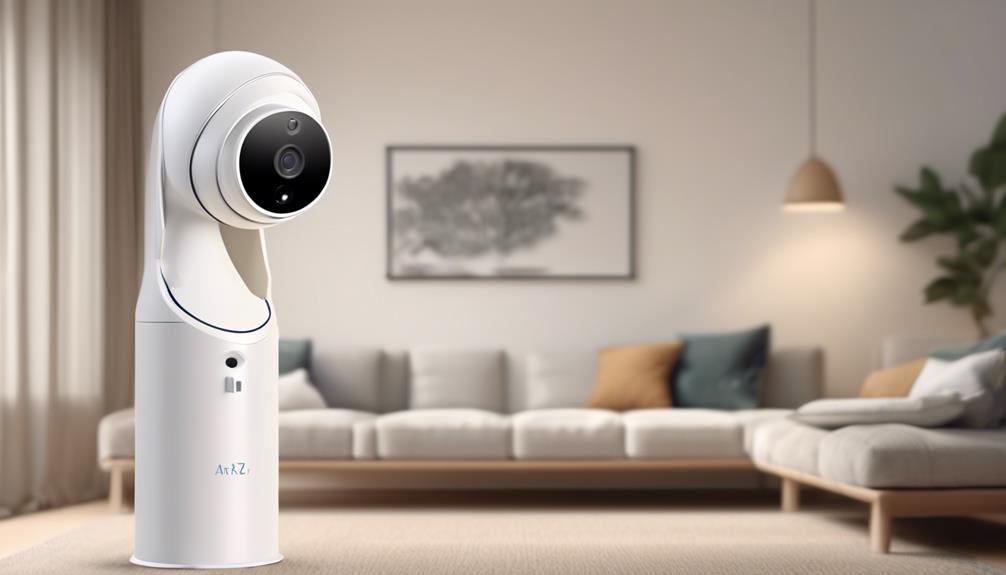
The distinct features that set home security apart from home automation highlight the essential benefits of home security systems in safeguarding our homes and providing peace of mind. When considering the benefits of home security systems, it's important to weigh the features, pros, and cons to make an informed decision.
| Features | Pros | Cons |
|---|---|---|
| 24/7 Monitoring | Enhanced Safety | Monthly Fees |
| Remote Access | Deterrence of Intruders | Initial Cost |
| Motion Detection | Quick Emergency Response | False Alarms |
| Smart Integration | Insurance Discounts | Privacy Concerns |
Home security systems offer 24/7 monitoring, providing an added layer of safety and peace of mind. They also allow for remote access, enabling homeowners to monitor their property from anywhere. Motion detection and smart integration further enhance security measures. Additionally, having a security system can act as a deterrent to potential intruders and may lead to insurance discounts. However, there are some drawbacks to consider, such as monthly fees, initial costs, and the possibility of false alarms. Privacy concerns may also arise with the integration of smart technology. Understanding these features, pros, and cons is crucial in making the right choice for your home security needs.
Advantages of Home Automation Technology
One can easily control and automate various home devices and systems using home automation technology. The advantages of integrating this technology into your home are numerous and impactful.
- Energy Efficiency: With home automation, you can optimize energy usage by scheduling when devices turn on and off, adjusting thermostat settings remotely, and integrating energy-efficient appliances into your system. This not only reduces your carbon footprint but also saves you money on utility bills.
- Convenience: Imagine being able to control your lights, locks, and security system from the convenience of your smartphone. Home automation technology provides the convenience of managing your home with ease, whether you're inside or away.
- Remote Access: The ability to monitor and control your home from anywhere in the world offers peace of mind and flexibility. Whether it's checking on your pets, adjusting the temperature, or receiving alerts about potential security breaches, remote access is a game-changer.
- Customization: Tailoring your home automation system to fit your specific needs and preferences allows for a personalized and seamless experience. From setting personalized lighting scenes to creating unique schedules, customization empowers you to make your home truly your own.
Frequently Asked Questions
Can Home Security Systems Be Integrated With Home Automation Technology?
Yes, home security systems can be integrated with home automation technology.
This integration benefits homeowners by allowing them to control both security and automation features through a single interface, enhancing convenience and efficiency.
However, it's important to consider potential security risks associated with integrating these systems, as interconnected devices may pose vulnerabilities if not properly secured.
Therefore, it's crucial to prioritize cybersecurity measures when implementing integrated home security and automation solutions.
Are There Any Privacy Concerns With Using Home Automation Technology?
Privacy implications and data security are important considerations when using home automation technology. We need to be mindful of potential risks related to sharing personal information and data breaches.
It's crucial to implement strong security measures and stay informed about any privacy concerns. We must prioritize safeguarding our data and privacy to fully benefit from the convenience and efficiency that home automation technology offers.
What Are Some Common Misconceptions About Home Security Systems?
Misconceptions about home security systems can be like shadows in the dark, lurking and causing unnecessary worry.
One common misconception is that they're expensive, but in reality, installation costs have decreased.
Some believe security features are limited, yet modern systems offer advanced options.
Understanding the benefits of home security can dispel these myths, empowering us to make informed decisions for a safer home.
How Can Home Automation Technology Improve Energy Efficiency in a Home?
We can improve energy efficiency in a home using smart thermostats and energy monitoring.
Smart thermostats allow us to control the temperature remotely and create schedules for heating and cooling.
Energy monitoring systems provide real-time data on energy usage, helping us identify areas for improvement.
What Are Some Potential Drawbacks of Relying Solely on Home Automation for Security Measures?
We've found that relying solely on home automation for security measures can have drawbacks. Automation limitations may leave blind spots in your security coverage, and security vulnerabilities in the technology could be exploited.
Integrating multiple technologies can create a more comprehensive and reliable security system. Mastery in this area involves understanding and addressing these potential drawbacks to ensure a robust and effective home security setup.
How Does IoT Impact Home Security and Automation?
IoT, or the Internet of Things, is the technology that allows devices to connect and communicate with each other. The difference between IoT and home automation lies in their scope of application. While home automation focuses on controlling household appliances, IoT impacts home security and automation by allowing seamless integration and remote monitoring of various smart devices.
Conclusion
In conclusion, while home security focuses on keeping your home safe from potential threats, home automation is all about making your life easier and more convenient.
Just like a well-guarded fortress protects its inhabitants, a smart home acts as a faithful servant, anticipating your every need and carrying out tasks with precision and efficiency.
So whether you're looking for protection or convenience, there are options to suit every homeowner's needs.
- About the Author
- Latest Posts
Introducing Ron, the home decor aficionado at ByRetreat, whose passion for creating beautiful and inviting spaces is at the heart of his work. With his deep knowledge of home decor and his innate sense of style, Ron brings a wealth of expertise and a keen eye for detail to the ByRetreat team.
Ron’s love for home decor goes beyond aesthetics; he understands that our surroundings play a significant role in our overall well-being and productivity. With this in mind, Ron is dedicated to transforming remote workspaces into havens of comfort, functionality, and beauty.
Smart Home Automation
Does Home Automation Increase Home Value

Curious about whether smart home technology increases the value of your property?
Home automation has become a popular trend in the real estate market, prompting many homeowners to ponder its impact on home value.
In this discussion, we'll explore the potential effects of incorporating smart home technology on property worth.
From the installation of smart devices to the considerations of cost versus value, we'll delve into the nuanced aspects of this growing trend.
Join us as we evaluate the impact of home automation on property value and consider the factors that could influence its effectiveness as an investment.
Key Takeaways
- Smart home technology revolutionizes the residential real estate market, enhancing convenience and efficiency for homeowners.
- Smart home security measures, such as smart locks and surveillance cameras, can lower insurance premiums and appeal to potential buyers.
- Home automation systems result in improved energy efficiency, increased comfort, and customization, leading to increased property appreciation.
- Integration of value-boosting smart devices, such as energy-efficient technology, security systems, voice-activated virtual assistants, automated lighting, and temperature control, significantly impacts property value.
The Rise of Smart Home Technology
The proliferation of smart home technology has revolutionized the way homeowners manage and interact with their living spaces, profoundly impacting the residential real estate market. Home connectivity has played a pivotal role in this transformation, enabling seamless integration of various devices and systems within homes. This has given rise to a new era of lifestyle integration, where homeowners can automate and control a wide array of functions, from lighting and temperature to security and entertainment, using their smartphones or voice commands.
The convenience and efficiency offered by these smart systems have significantly enhanced the quality of life for homeowners, leading to a growing demand for such features in residential properties. Data from market studies reveals a compelling correlation between the incorporation of smart home technology and property value. Homes equipped with advanced connectivity and automation features are commanding higher prices and experiencing shorter time on the market.
The appeal of a modern, tech-enabled lifestyle is driving this trend, as buyers increasingly seek out properties that offer the convenience and security afforded by smart home systems. As such, the rise of smart home technology has become a defining factor in the valuation and desirability of residential real estate.
Understanding Home Automation Systems
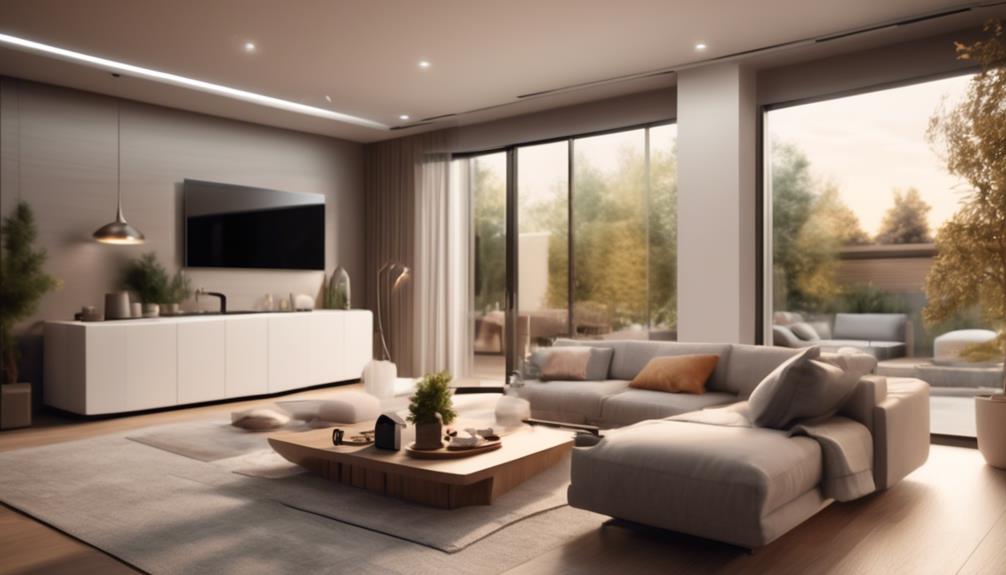
We'll start by exploring the basics of smart home technology and how it forms the foundation of home automation systems.
Understanding the benefits of automation, from increased energy efficiency to enhanced security, is essential in comprehending the value it adds to homes.
Smart Home Basics
Understanding home automation systems requires a grasp of the technology and its practical applications within a household. Automation benefits encompass improved energy efficiency, convenience, and enhanced security.
Smart home security, a crucial aspect of home automation, integrates technologies such as smart locks, surveillance cameras, and motion sensors to provide comprehensive protection. These systems enable remote monitoring and control, allowing homeowners to oversee their property from anywhere. Additionally, smart home security measures can contribute to lower insurance premiums, adding to the overall value of the property.
When evaluating the impact of home automation on home value, it's important to recognize the appeal of enhanced security features to potential buyers. Smart home basics, including security systems, represent a significant factor in the ongoing evolution of home automation and its influence on property values.
Benefits of Automation
Utilizing home automation systems can result in improved energy efficiency, enhanced security, and added convenience within a household.
- Energy Efficiency: Automated thermostats, lighting, and appliances can optimize energy usage, leading to cost savings and reduced environmental impact.
- Enhanced Security: Smart cameras, door locks, and motion sensors provide advanced monitoring and control, offering peace of mind and protection against intruders.
- Added Convenience: Automated routines for tasks like adjusting temperature, turning off lights, and managing entertainment systems simplify daily routines, enhancing comfort and freeing up time for other activities.
These benefits not only contribute to a more comfortable and secure living environment but also align with the modernization and customization that today's market demands. This level of luxury and convenience can lead to increased property appreciation and heightened market demand.
Impact of Smart Devices on Property Value
Smart devices have been shown to have a measurable impact on property value, according to data-driven studies in the real estate industry. The integration of smart devices into a home can significantly influence its resale value and market demand. Home automation's influence on market demand is evident in the way potential buyers perceive the convenience, security, and energy efficiency a smart home offers. The table below presents some key smart devices and their impact on property value.
| Smart Device | Impact on Property Value |
|---|---|
| Smart Thermostats | Increased value due to energy efficiency and cost savings |
| Smart Security Systems | Higher perceived security leading to increased property value |
| Smart Lighting | Enhanced ambiance and energy efficiency contributing to higher value |
| Smart Appliances | Upscale appeal and energy efficiency leading to increased value |
| Smart Home Hub | Centralized control and automation increasing property value |
These smart devices not only enhance the quality of life for homeowners but also appeal to potential buyers, ultimately increasing the overall property value. As the demand for smart homes continues to grow, their impact on property value is expected to become even more pronounced.
Key Smart Home Features for Value
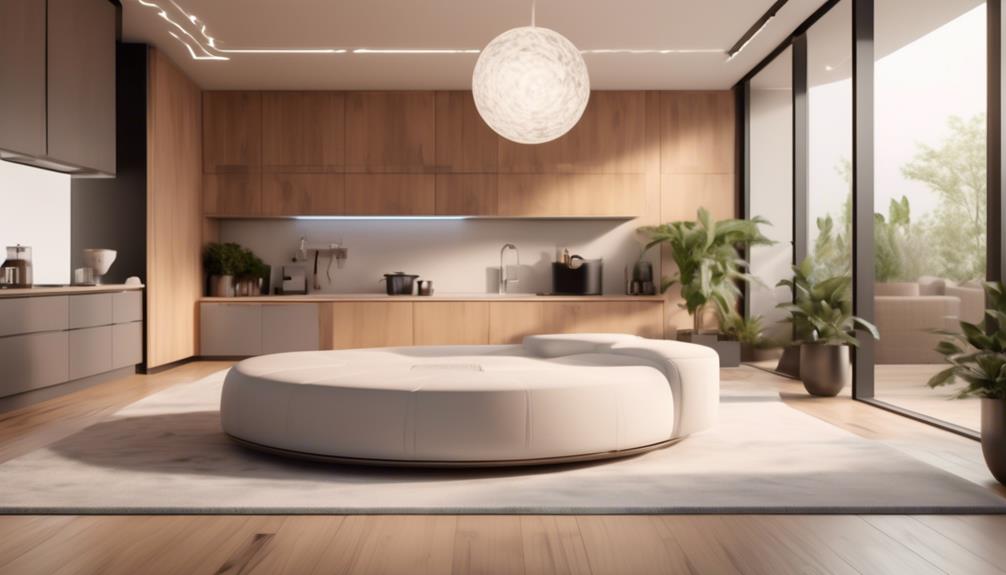
We've identified three key smart home features that can significantly impact property value:
- Value-boosting smart devices
- Energy-efficient technology
- Security and safety systems
These features not only enhance the convenience and comfort of a home but also contribute to cost savings and peace of mind for homeowners.
Value-Boosting Smart Devices
To enhance the value of a home, it's crucial to consider integrating key smart home features. These features, such as energy-efficient appliances, smart thermostats, and security systems, have been shown to positively impact the overall property value.
Energy-Efficient Appliances: Smart devices, including refrigerators, washers, and dryers, can significantly reduce energy consumption. This leads to long-term cost savings for homeowners.
Smart Thermostats: These devices optimize heating and cooling based on usage patterns. This leads to energy savings and increased comfort for residents.
Security Systems: Smart security devices, such as cameras and alarms, provide enhanced protection. This can lead to potential insurance discounts and increased peace of mind for homeowners.
These smart devices not only offer convenience and efficiency but also contribute to home value appreciation. They align with the growing demand for sustainable and secure living spaces.
Energy-Efficient Technology
As we explore the realm of home automation and its impact on property value, a critical aspect to consider is the integration of energy-efficient technology, which encompasses a range of smart home features known to enhance the overall value of a residence. The table below outlines key smart home features for energy savings and technology integration.
| Smart Home Feature | Description | Benefits |
|---|---|---|
| Smart Thermostats | Regulates temperature based on occupancy | Reduces energy consumption and cost |
| LED Lighting Systems | Energy-efficient lighting solutions | Longer lifespan, lower energy usage |
| Solar Panels | Converts sunlight into electricity | Significant energy cost savings over time |
| Energy Monitoring | Tracks energy usage in real-time | Identifies energy hogs, promotes efficiency |
| Smart Appliances | Energy-saving, connected home appliances | Reduces energy waste and overall consumption |
These energy-efficient technologies not only contribute to environmental sustainability but also result in tangible cost savings for homeowners.
Security and Safety Systems
Implementing security and safety systems in a home can significantly enhance its value and appeal to potential buyers. These systems not only provide peace of mind but also offer tangible benefits that contribute to the overall value of a property.
- Emergency Response: Integration of smart home technology for emergency response, such as smoke and carbon monoxide detectors linked to security systems, ensures a swift reaction to potential threats, increasing the safety and security of the home.
- Surveillance Cameras: Installing surveillance cameras equipped with remote monitoring capabilities allows homeowners to keep a watchful eye on their property, deterring potential intruders and providing valuable evidence in the event of a security breach.
- Smart Locks: Incorporating smart locks that can be remotely controlled and monitored adds an additional layer of security, enhancing the overall appeal and value of the property.
Cost Vs. Value: Smart Home Investments
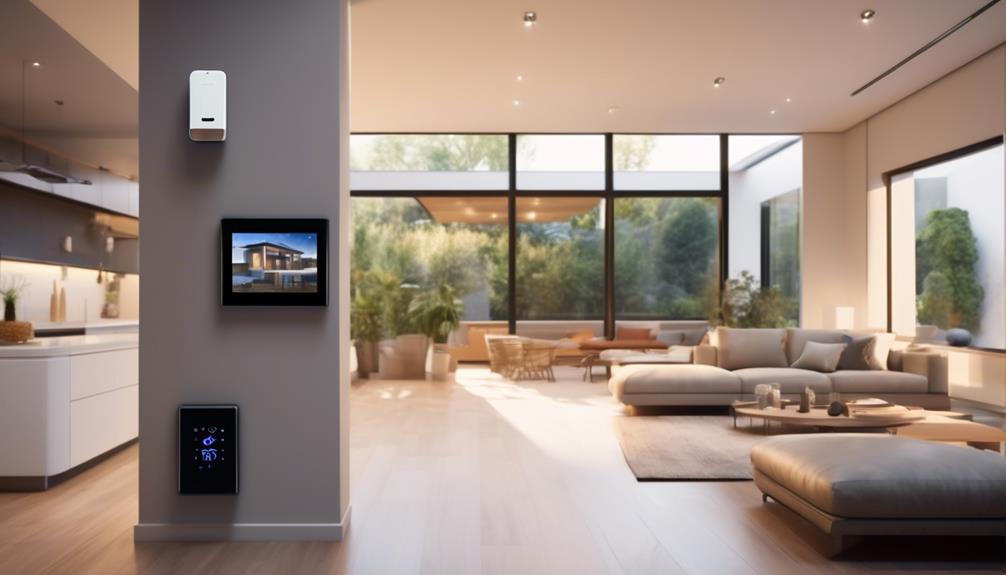
Investing in smart home technology can yield a significant return on investment by increasing the overall value of the property. According to a study by Consumer Technology Association, homes with smart technology can sell for 3-5% more than their traditional counterparts. This increase in home value is attributed to the growing demand for tech-savvy homes and the potential cost savings associated with smart energy management systems.
However, it's important to consider the potential risks of smart home investments, such as the rapid evolution of technology leading to potential obsolescence and the initial high cost of installation and setup. To mitigate these risks, homeowners should carefully assess the long-term benefits of each smart home investment and consider technologies with a proven track record of longevity and adaptability.
Additionally, incorporating scalable and interoperable systems can future-proof the home against rapid technological advancements. By carefully weighing the home automation ROI and smart home investment risks, homeowners can make informed decisions that enhance both their quality of living and the overall value of their property.
Integrating Automation for Increased Home Value

The potential increase in home value associated with smart technology adoption has led to a growing interest in integrating automation systems to further enhance property value. When considering the integration of automation for increasing property value, several key factors should be taken into account:
- Seamless Integration: It's essential to ensure that the automation systems seamlessly integrate with the existing infrastructure of the home. This includes compatibility with current wiring, appliances, and other smart devices.
- Energy Efficiency: Home technology integration should prioritize energy-efficient solutions. Smart thermostats, lighting, and appliances not only improve the sustainability of the home but also appeal to buyers seeking eco-friendly properties.
- Security and Safety Features: Implementing automation that enhances security and safety can significantly increase property value. This includes smart locks, surveillance systems, and smoke/carbon monoxide detectors.
Security and Safety Benefits of Home Automation

Smart home automation systems offer enhanced security and safety features that contribute to the overall value and appeal of a property. Incorporating security cameras into a home automation system can provide homeowners with peace of mind and the ability to monitor their property remotely. This added layer of security not only deters potential intruders but also assists in the swift identification and resolution of any security issues. Moreover, many home insurance companies offer discounts for properties equipped with advanced security systems, including those integrated into home automation setups. These discounts can result in substantial long-term savings for homeowners.
To highlight the impact of security and safety features in home automation, consider the following table:
| Security and Safety Features | Benefits |
|---|---|
| Security Cameras | Remote monitoring, intrusion deterrence |
| Automated Door Locks | Enhanced access control, improved home security |
| Smoke and Carbon Monoxide Detectors | Early detection of potential hazards, increased safety |
The integration of security and safety features within home automation not only elevates the protection of the property but also aligns with the growing emphasis on home security in the real estate market.
Energy Efficiency and Eco-friendly Upgrades
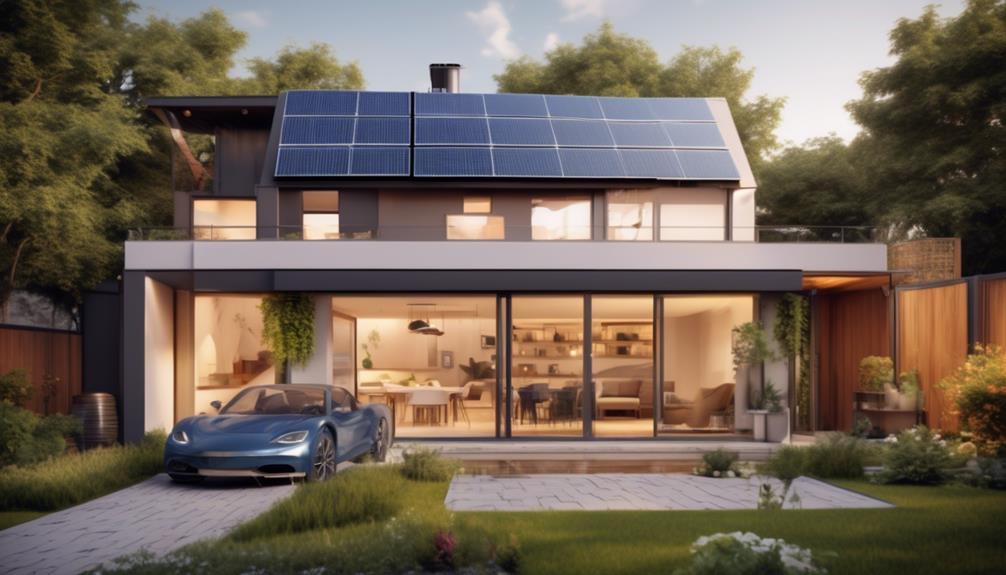
We've found that integrating energy-efficient upgrades in a home can lead to substantial cost savings over time.
Not only does this benefit homeowners financially, but it also has a positive environmental impact, reducing the home's carbon footprint.
Additionally, incorporating eco-friendly features adds to the overall appeal of a smart home, aligning with the growing interest in sustainable living.
Cost Savings Potential
Implementing energy-efficient and eco-friendly upgrades in a home can lead to significant cost savings over time, making it a smart investment for homeowners. These upgrades not only contribute to a more sustainable environment but also result in reduced utility bills and long-term financial benefits.
Here's how energy-efficient and eco-friendly upgrades can lead to cost savings:
- Lower Utility Bills: Upgrading to energy-efficient appliances, smart thermostats, and LED lighting can significantly reduce electricity and water consumption, resulting in lower monthly utility bills.
- Tax Incentives: Many governments offer tax incentives and rebates for homeowners who make energy-efficient upgrades, providing additional cost savings opportunities.
- Increased Home Value: Homes with energy-efficient features often have higher resale values, allowing homeowners to recoup their initial investment and potentially make a profit in the long run.
Environmental Impact
Energy-efficient and eco-friendly upgrades in a home have a measurable impact on reducing energy consumption and promoting sustainability. These upgrades not only benefit the environment but also lead to cost savings for homeowners. When considering the environmental impact of home automation, it's essential to assess the reduction in energy usage and the implementation of eco-friendly technologies. The table below highlights the potential environmental impact of various energy-efficient and eco-friendly upgrades.
| Upgrade | Energy Consumption Reduction | Environmental Impact |
|---|---|---|
| Smart Thermostat | Up to 15% | Reduced carbon footprint and energy conservation |
| LED Lighting | Up to 80% | Lower electricity usage and decreased greenhouse gas emissions |
| Solar Panels | Up to 100% during peak times | Renewable energy generation and reduced reliance on non-renewable resources |
Smart Home Appeal
Smart home appeal can be significantly enhanced by incorporating energy-efficient and eco-friendly upgrades, resulting in both environmental benefits and cost savings for homeowners. These upgrades not only contribute to a more sustainable environment but also increase the overall value of the property.
Some aspects that contribute to the smart home appeal include:
- Smart home aesthetics, such as sleek and modern designs that integrate energy-efficient features seamlessly into the overall look and feel of the home.
- Energy-efficient appliances and systems that reduce utility costs and minimize the home's carbon footprint.
- Home automation resale potential, as eco-friendly features and energy-efficient upgrades can attract buyers seeking sustainable and cost-effective properties.
Smart Home Technology Trends in Real Estate

As the demand for innovative home features continues to grow in the real estate market, smart home technology is increasingly becoming a significant factor in property value and buyer preferences. Smart home technology in rental properties is on the rise, with landlords integrating features such as smart thermostats, keyless entry systems, and security cameras to attract tech-savvy tenants. This trend is fueled by the growing desire for convenience, energy efficiency, and enhanced security among renters.
In luxury real estate, smart home trends are setting new standards for high-end properties. The integration of advanced automation systems, such as voice-activated controls, smart appliances, and integrated entertainment systems, has become a hallmark of upscale residences. Luxury homebuyers are increasingly seeking properties with state-of-the-art smart home features that offer seamless connectivity and personalized experiences.
Data from real estate market studies indicates that properties with smart home technology tend to command higher selling prices and shorter time on the market, reflecting the increasing value that buyers place on these modern conveniences. As smart home technology continues to evolve, its impact on real estate trends is expected to become even more pronounced.
Potential Drawbacks of Home Automation
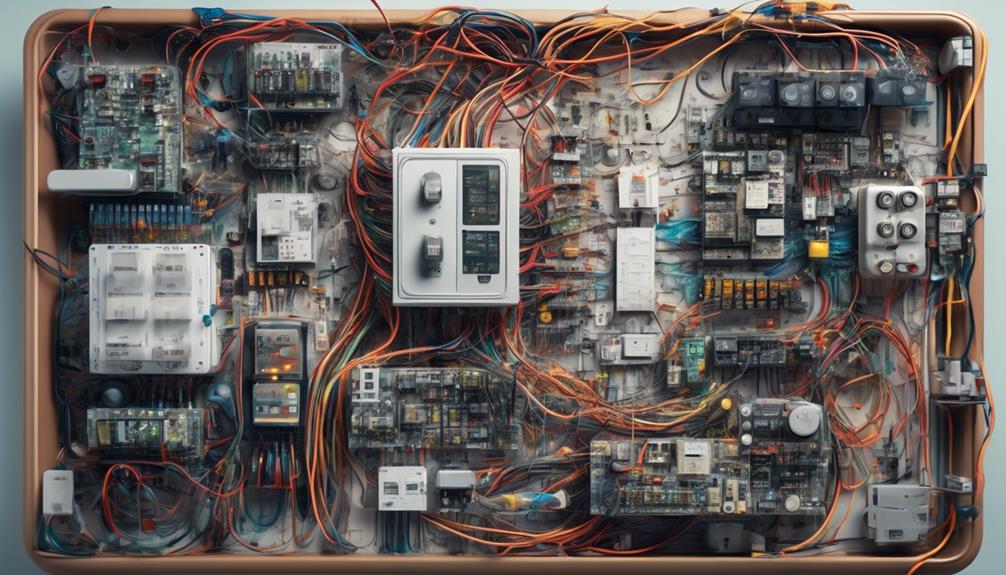
While home automation offers numerous benefits, it's important to consider potential drawbacks that may affect homeowners' experiences and property values.
When evaluating the impact of home automation on home value, it's crucial to take into account potential risks and privacy concerns.
- Potential Risks
Home automation systems are susceptible to technical malfunctions, such as system failures or hacking, which may compromise the security and functionality of a smart home. These risks could lead to costly repairs and security vulnerabilities, impacting the overall appeal and value of the property.
- Privacy Concerns
The integration of smart devices in homes raises privacy concerns due to the collection and potential misuse of personal data. Homeowners may be wary of the implications of constant monitoring and data sharing, which could deter potential buyers and affect the perceived value of the property.
- Dependency on Technology
Reliance on home automation systems for essential functions, such as heating, cooling, and security, may pose challenges during system outages or technical glitches, potentially disrupting the daily lives of homeowners and impacting the property's desirability and value.
Appraising Homes With Smart Features

When considering the appraisal of homes with smart features, it's essential to factor in potential drawbacks and privacy concerns associated with home automation, as these aspects can influence the perceived value and marketability of the property.
Appraising technology in homes involves assessing the impact of smart features on the overall value of the property. While smart home technology can enhance convenience and energy efficiency, appraisers need to carefully analyze the potential drawbacks, such as the cost of maintenance and the risk of technology obsolescence.
Additionally, privacy concerns related to data security and surveillance capabilities of smart devices can influence the perceived value of the property. It's crucial to consider home value trends in the local market and the preferences of potential buyers when appraising homes with smart features.
Appraisers should also stay informed about the latest advancements in home automation and their impact on property values. By incorporating these factors into the appraisal process, a more accurate representation of the property's value can be achieved.
Tips for Maximizing Home Automation ROI

To maximize the return on investment (ROI) for home automation, homeowners should carefully evaluate the potential cost savings and efficiency improvements associated with smart devices and systems. Maximizing efficiency is crucial for achieving the highest ROI from home automation.
Here are some tips for maximizing the ROI of home automation:
- Invest in Energy-Efficient Devices: Prioritize smart devices that are energy-efficient, such as smart thermostats, LED lighting, and energy monitoring systems. These can lead to significant cost savings on utility bills over time.
- Integrate Systems for Seamless Automation: Smart home design should focus on integrating various systems to work together seamlessly. This can include linking lighting, security, and climate control systems to maximize convenience and efficiency.
- Regularly Update and Maintain Smart Systems: Keeping smart devices and systems up to date is essential for ensuring optimal performance and efficiency. Regular maintenance and updates can prevent malfunctions and prolong the lifespan of smart devices.
Frequently Asked Questions
What Are the Potential Privacy Concerns Associated With Home Automation Systems?
Privacy concerns associated with home automation systems include potential data security risks, ethical implications, and legal regulations.
The collection of personal information through smart devices raises concerns about unauthorized access and misuse of data.
Additionally, the constant monitoring of activities within the home may infringe on individuals' privacy.
It's essential to address these issues to ensure the ethical and secure implementation of home automation systems.
How Does Home Automation Affect the Insurance Premiums for Homeowners?
Home automation can be likened to a shield, impacting insurance premiums positively. Enhanced security and safety features like smart locks, surveillance cameras, and smoke detectors reduce the risk of incidents, leading to potential lower premiums.
Data shows that homes with automation are less prone to theft and damage, thus mitigating insurance claims. Insurers recognize these risk-reducing benefits, making home automation an attractive investment for homeowners seeking to lower insurance costs.
Are There Any Potential Health Risks Associated With Prolonged Exposure to Smart Home Devices?
We need to consider potential health implications of prolonged exposure to smart home devices, particularly related to electromagnetic radiation. Research on this topic is ongoing, and the data isn't conclusive.
However, some studies suggest that certain smart home devices emit low levels of electromagnetic radiation that could potentially pose health risks with long-term exposure. It's essential to stay informed about the latest research findings to make informed decisions about smart home technology.
How Do Smart Home Features Impact the Resale Value of a Home in a Competitive Real Estate Market?
Smart home features can significantly impact the resale value in a competitive real estate market. Integration challenges and privacy concerns may affect potential buyers. However, the convenience and energy-saving benefits of home automation can increase the home's value.
Insurance premiums may decrease due to enhanced security from smart devices. While potential health risks exist, the overall impact on resale value is positive, especially as smart home technology becomes more mainstream and expected in homes.
What Are Some Common Challenges Homeowners Face When Integrating Multiple Smart Devices and Systems?
Integrating multiple smart devices and systems can present challenges for homeowners. Compatibility issues between different brands and protocols often arise, making seamless integration difficult. According to a survey by Statista, 43% of homeowners struggle with these challenges.
Addressing these issues requires careful planning and research to ensure that all devices work together harmoniously. It's essential to consider compatibility and integration challenges when implementing home automation for a smoother experience.
Will Implementing Smart Security and Home Automation Increase the Value of My Home?
Investing in smart security can significantly increase the value of your home. With advanced features like video surveillance, smart locks, and remote monitoring, potential buyers will see your property as safer and more desirable. Home automation adds convenience, energy efficiency, and modern appeal, making it an attractive selling point.
Conclusion
In conclusion, the old saying 'you get what you pay for' rings true when it comes to home automation.
While it may come with a cost, the potential increase in property value and the convenience it offers can make it a worthwhile investment.
As smart home technology continues to evolve and become more mainstream, it's important for homeowners to carefully consider the impact and potential return on investment before diving into the world of home automation.
- About the Author
- Latest Posts
Introducing Ron, the home decor aficionado at ByRetreat, whose passion for creating beautiful and inviting spaces is at the heart of his work. With his deep knowledge of home decor and his innate sense of style, Ron brings a wealth of expertise and a keen eye for detail to the ByRetreat team.
Ron’s love for home decor goes beyond aesthetics; he understands that our surroundings play a significant role in our overall well-being and productivity. With this in mind, Ron is dedicated to transforming remote workspaces into havens of comfort, functionality, and beauty.
Smart Home Automation
What Is the Difference Between Home Automation and Home Appliances?

In contemplating the sphere of contemporary life, it’s effortless to become captivated by the charm of handy devices and appliances.
But as we dig deeper, we find that the distinction between home automation and home appliances is more than just a matter of semantics.
Home automation encompasses a comprehensive system that integrates various devices to streamline and enhance the functionality of a home, while home appliances refer to individual devices designed to perform specific tasks.
Understanding this contrast is crucial in navigating the landscape of smart homes and making informed decisions about how we can optimize our living spaces.
Key Takeaways
- Home automation integrates smart technology into household devices, allowing control of lighting, temperature, security, and entertainment systems.
- Home appliances perform specific tasks to make chores manageable and efficient, such as cooking, cleaning, and food preservation.
- Automation technology reduces the need for human intervention and can be controlled through centralized control or mobile devices.
- Integration of home appliances with automation systems enables centralized management, convenience, and customization options for users.
Definition of Home Automation
Home automation refers to the integration of smart technology into household devices to automate and simplify everyday tasks. With home automation integration, we can control various aspects of our homes, such as lighting, temperature, security, and entertainment systems, using centralized control or mobile devices. This technology has seen significant advancements in recent years, with automation technology advancements enabling seamless connectivity and enhanced convenience.
The integration of automation technology has revolutionized the way we interact with our homes. We can now schedule and regulate our home environment with precision, optimizing energy usage and creating comfortable living spaces. Additionally, automation technology advancements have led to the development of sophisticated systems that can learn and adapt to our preferences, further enhancing the efficiency and effectiveness of home automation.
As enthusiasts seeking mastery in home automation, understanding the intricacies of integration and the latest automation technology advancements is crucial. It allows us to harness the full potential of these technological innovations, creating homes that aren't only smart but also tailored to our unique needs and preferences.
Definition of Home Appliances
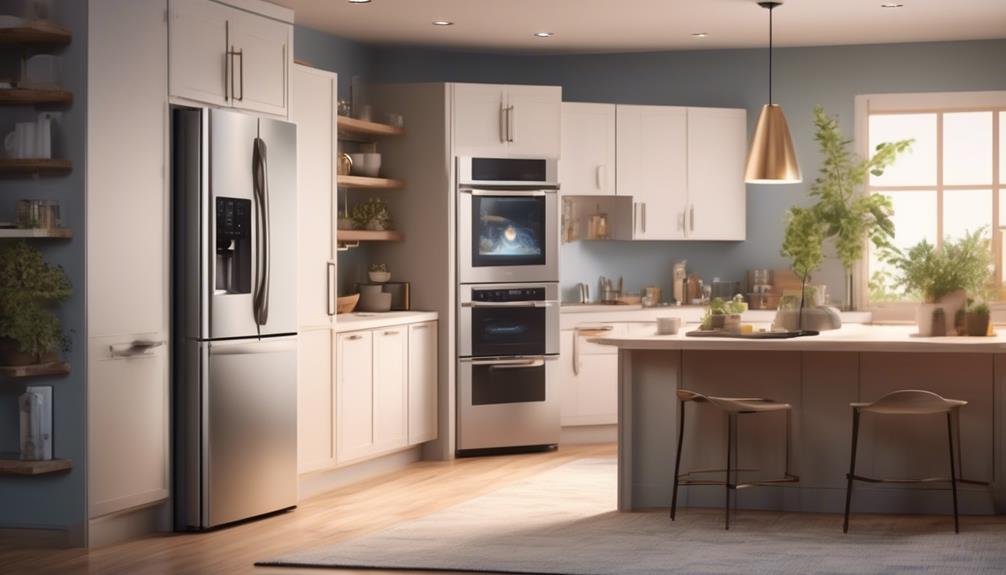
Let's begin by defining what we mean by home appliances and how they differ from home automation.
We'll look at the basic functions of appliances and compare their automation capabilities.
This will help us understand the distinct roles that appliances play in our homes and how they interact with automation technologies.
Basic Functions of Appliances
Appliances in a household perform essential tasks, such as cooking, cleaning, and preserving food, to simplify daily routines and enhance comfort. The basic functions of home appliances have evolved significantly with technology advancements.
Cooking appliances like stoves and ovens have advanced from traditional gas burners to induction cooktops and smart ovens that can be controlled remotely. Cleaning appliances, such as vacuum cleaners and washing machines, have seen innovations like robotic vacuums and eco-friendly, water-efficient washers.
Refrigerators now come with features like temperature control, Wi-Fi connectivity, and even cameras to monitor food supplies. These technological advancements not only improve efficiency but also contribute to energy conservation and sustainability.
Understanding these basic functions enables users to make informed decisions when selecting appliances that best fit their lifestyle and needs.
Automation Capabilities Comparison
Having understood the basic functions of household appliances, it's crucial to compare their automation capabilities to assess their adaptability to modern technology. When comparing the automation capabilities of home appliances, a few key factors come into play:
- Efficiency comparison: Assessing how well an appliance can perform its tasks with minimal energy consumption and optimal output.
- Cost effectiveness analysis: Evaluating the overall cost of using and maintaining an automated appliance compared to its manual counterpart.
- User experience, Customization options: Considering the ease of use and the ability to tailor the automation settings to individual preferences.
These factors are essential in determining the practicality and utility of integrating automation into household appliances, providing valuable insights for consumers seeking mastery in home automation.
Scope of Home Automation
In the realm of home automation, the scope encompasses the integration of various technological systems to streamline and enhance the functionality and control of household operations.
Automation technology and smart home devices play a pivotal role in expanding the scope of home automation.
Automation technology refers to the use of control systems and information technologies to reduce the need for human intervention in various processes. This can include automated lighting, climate control, security systems, and entertainment systems, among others.
Smart home devices, on the other hand, are physical devices that connect to the internet and can be controlled and monitored remotely. These devices include smart thermostats, smart locks, smart cameras, and smart speakers, all of which contribute to the broader scope of home automation.
The scope of home automation is continually evolving, with advancements in technology leading to new possibilities for integrating and controlling various household systems.
Understanding the scope of home automation is crucial for anyone looking to create a more streamlined and efficient home environment through the use of technology.
Scope of Home Appliances
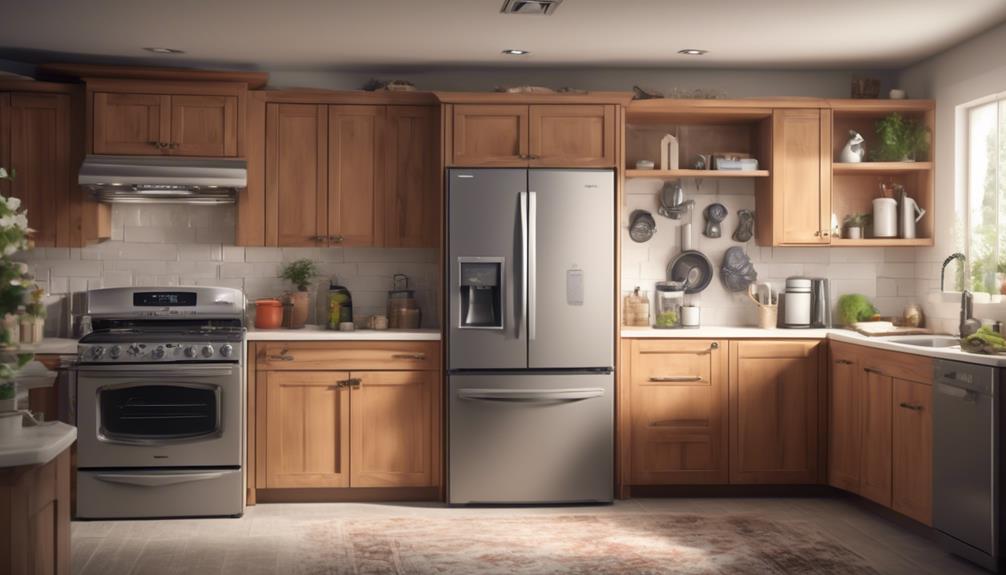
Let's talk about the scope of home appliances.
We'll cover the different types of home appliances, how they function, and their everyday use.
Additionally, we'll explore the integration of home appliances with automation systems.
Home Appliance Types
Home appliances encompass a wide range of electrical and mechanical devices designed to perform specific household functions, such as cooking, cleaning, and food preservation.
When it comes to types of home appliances, there are several categories to consider:
- Cooking appliances: Including stoves, ovens, microwaves, and cooktops.
- Cleaning appliances: Such as vacuum cleaners, washing machines, and dishwashers.
- Food preservation appliances: Like refrigerators and freezers.
Efficiency comparison among these types of home appliances is crucial for making informed purchasing decisions. For instance, energy-efficient refrigerators and washing machines can lead to significant cost savings over time.
Understanding the different types of home appliances and their efficiency can help homeowners create a more functional and sustainable living space.
Functionality and Use
When considering the functionality and use of home appliances, it's important to assess how these devices simplify and enhance our daily lives. Home appliances are designed to perform specific tasks, aiming to make household chores more manageable and efficient. Below is a functionality comparison table that illustrates the diverse range of tasks that home appliances are capable of performing and how they contribute to the overall user experience.
| Appliance | Functionality | User Experience |
|---|---|---|
| Refrigerator | Food storage, preservation, and organization | Convenient access to fresh produce |
| Washing Machine | Laundry cleaning and stain removal | Time-saving and efficient |
| Dishwasher | Dish cleaning and sanitization | Reduced manual effort and clean dishes |
| Microwave | Quick reheating and cooking | Fast meal preparation |
Understanding the functionality and user experience of these appliances can help in optimizing their usage within the home environment.
Integration With Automation
Discussing the integration of home appliances with automation reveals their potential for streamlining household tasks and enhancing efficiency. As technology advances, the seamless integration of home appliances with smart automation systems has become increasingly crucial.
However, there are some integration challenges that need to be addressed to fully optimize the benefits of this integration. Smart technology compatibility is a key consideration when integrating home appliances with automation, ensuring that all devices can communicate and work together effectively.
Additionally, interoperability among different brands and types of appliances poses a significant challenge, as standardization in the industry is still evolving.
Overcoming these challenges will lead to a more interconnected and efficient home environment, where appliances work in harmony with automation systems.
Functionality of Home Automation
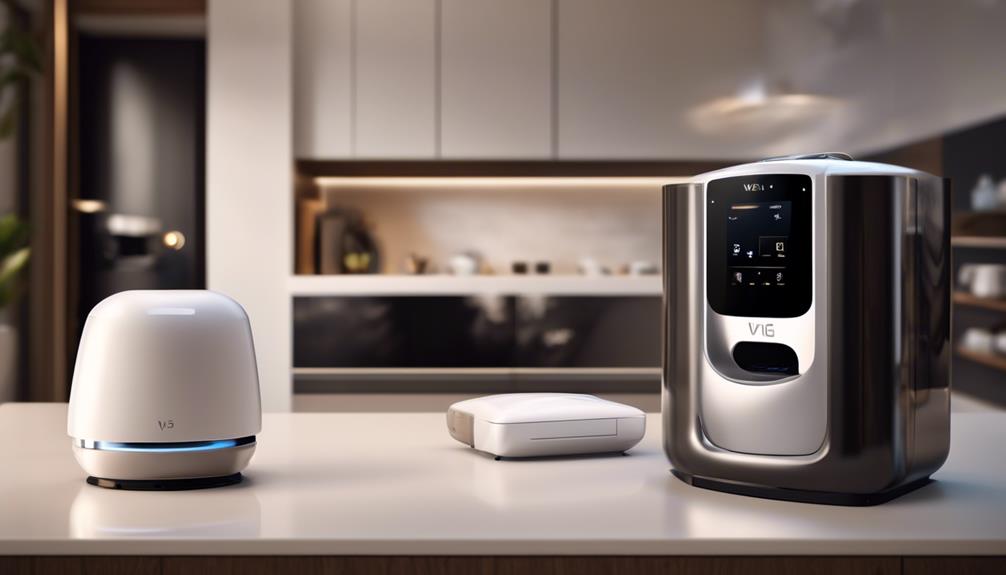
In modern households, the functionality of home automation facilitates seamless control and management of various electronic devices and systems. When comparing the functionality of home automation with traditional home appliances, the key distinction lies in automation integration.
Unlike standalone appliances, home automation systems enable the centralized management of multiple devices through a single interface, allowing for a more streamlined and interconnected experience.
The functionality comparison between home automation and traditional appliances reveals that home automation offers a higher degree of convenience and efficiency. Through automation integration, users can coordinate and customize the operation of diverse devices, such as lighting, thermostats, security cameras, and entertainment systems, from a single control point. This level of centralized control enhances the overall user experience, providing greater flexibility and adaptability in managing various aspects of home living.
Moreover, the advanced functionalities of home automation systems often include programmable settings, remote access capabilities, and smart device compatibility, further enriching the user experience. These features contribute to the seamless integration and efficient management of electronic devices, ultimately elevating the functionality of home automation in modern households.
Functionality of Home Appliances
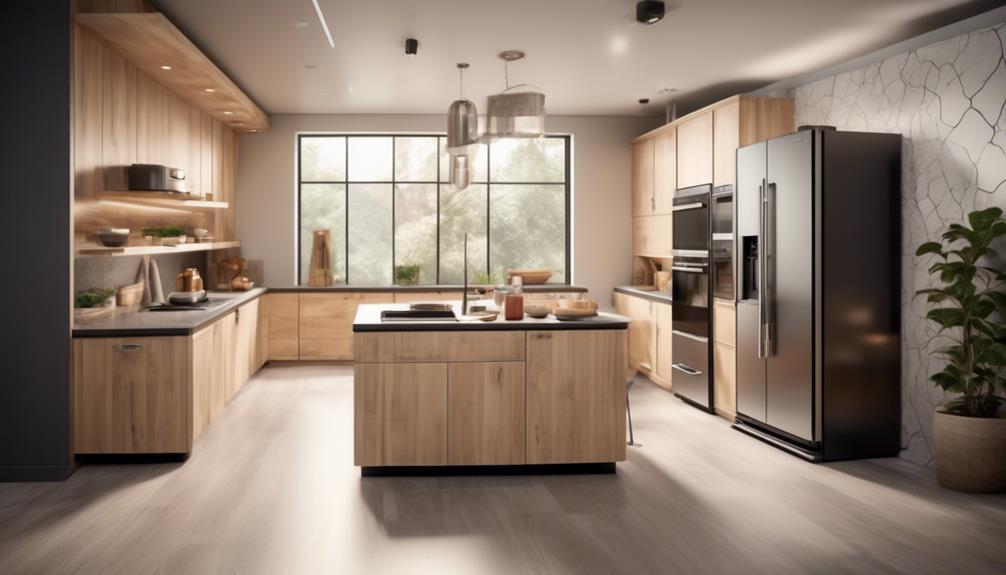
The enhanced functionality of home appliances, in contrast to the centralized control of multiple devices in home automation, is a pivotal aspect of modern household management. Home appliances today are designed with advanced technology integration to provide convenience, efficiency, and improved user experience.
- Efficiency: Modern home appliances are equipped with features that maximize energy efficiency, such as programmable settings, smart sensors, and energy-saving modes. This not only reduces utility costs but also aligns with sustainable living practices.
- Convenience: The functionality of home appliances now extends beyond basic operations. Many appliances offer remote access, allowing users to monitor and control them from anywhere via smartphone apps. Additionally, voice command integration with virtual assistants further enhances convenience in managing household tasks.
- User Experience: With intuitive interfaces and interactive displays, home appliances provide a user-friendly experience. Customizable settings, automated operation, and self-diagnostic capabilities contribute to a seamless user experience, making household management more efficient and stress-free.
The integration of advanced technology into home appliances has significantly transformed household management, offering users greater control, efficiency, and convenience.
Integration of Home Automation
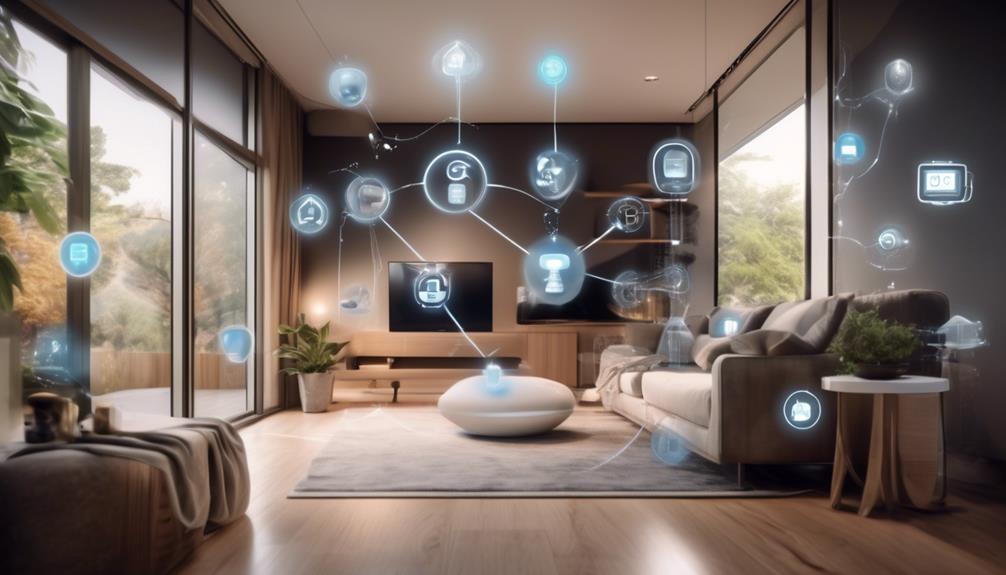
Home automation integrates various household devices and systems to streamline and enhance the management of our living spaces. However, the integration of these devices and systems presents various challenges.
One of the main challenges is ensuring compatibility between different technologies. As technological advancements continue to evolve, integrating older devices with newer ones can be a complex task.
Additionally, ensuring seamless communication and interaction between various automated systems, such as security, lighting, heating, and entertainment, requires meticulous planning and execution.
Technological advancements have played a crucial role in addressing integration challenges. The development of unified protocols and standards, such as Zigbee, Z-Wave, and Thread, has significantly improved the interoperability of different devices.
Moreover, the rise of artificial intelligence and machine learning has enabled home automation systems to adapt and learn from user behavior, leading to more seamless integration and improved user experience.
Integration of Home Appliances
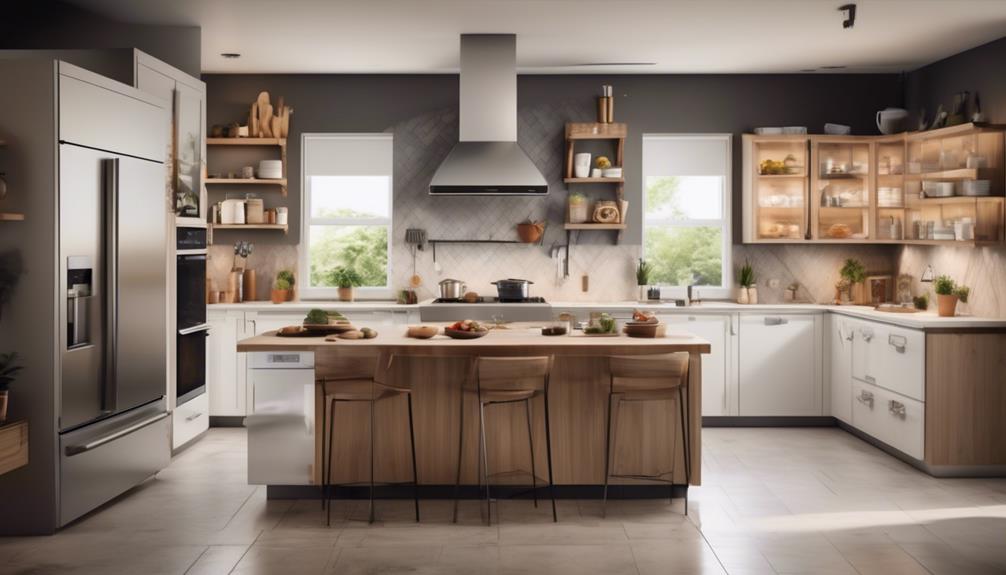
Addressing the challenges of compatibility and seamless communication, integrating home appliances with automated systems requires meticulous coordination and technological advancements to ensure a streamlined user experience. The integration benefits of home appliances include increased energy efficiency, improved convenience, and enhanced security.
- Energy Efficiency: Integration allows for smart scheduling and energy usage optimization, resulting in reduced energy consumption and lower utility bills.
- Improved Convenience: With integration, users can remotely control and monitor their home appliances, providing convenience and flexibility in managing household tasks.
- Enhanced Security: Integrated appliances can be part of a comprehensive home security system, offering features such as automated lighting and remote monitoring to enhance the safety of the household.
Technology advancements play a crucial role in enabling seamless integration of home appliances. The development of standardized communication protocols, such as Wi-Fi, Zigbee, and Z-Wave, allows different devices to communicate effectively within a smart home ecosystem. Additionally, advancements in artificial intelligence and machine learning have enabled appliances to learn user preferences and adapt their behavior accordingly, further enhancing the overall user experience.
As technology continues to evolve, the integration of home appliances with automated systems will only become more sophisticated, offering greater benefits and convenience to homeowners.
Benefits of Home Automation
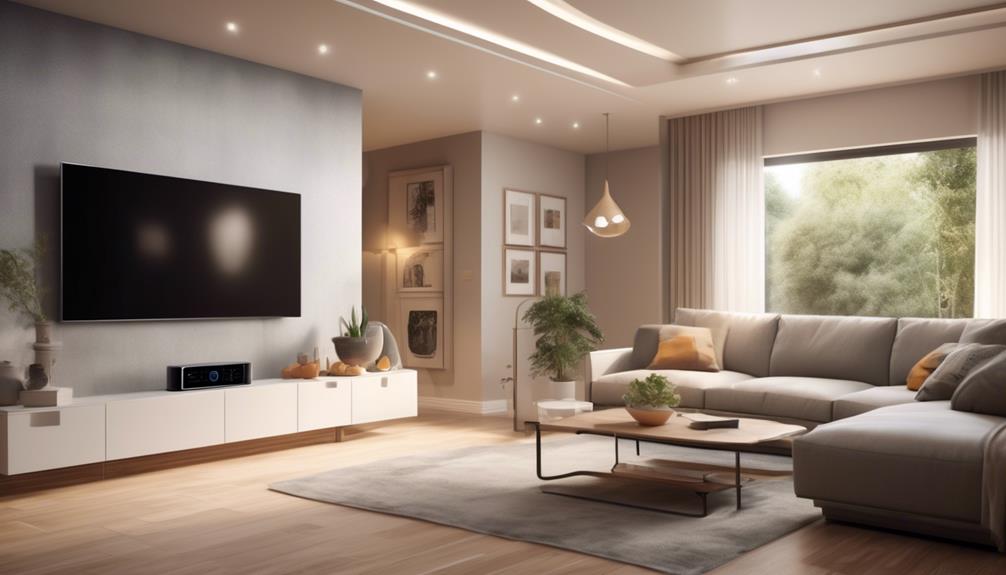
Let's talk about the benefits of home automation.
One major advantage is the ability to increase energy efficiency. With home automation, you can easily control and monitor your energy usage. You can set schedules for lights and appliances to turn on and off, adjust thermostat settings remotely, and receive real-time energy usage data. This not only helps you save money on your energy bills but also reduces your carbon footprint.
Another benefit of home automation is the enhancement of security features. By integrating security cameras, motion sensors, and smart door locks into your automation system, you can keep a close eye on your property and receive instant alerts in case of any suspicious activity. This added layer of security provides peace of mind and can deter potential intruders.
In addition to energy efficiency and security, home automation also offers convenient remote control. With the use of a smartphone or tablet, you can easily control various aspects of your home from anywhere. Whether it's adjusting the temperature, turning on the lights, or even starting your coffee maker, you have the convenience of managing your home remotely.
These aspects of home automation can truly transform the way we interact with our homes on a daily basis. The ability to automate and control various functions not only makes our lives easier but also provides a more comfortable and secure living environment.
Increased Energy Efficiency
By implementing home automation systems, we can significantly improve our energy efficiency, leading to reduced utility costs and a more sustainable lifestyle. This is achieved through the optimization and control of various home devices and systems.
- Smart thermostats regulate temperature based on occupancy, leading to increased comfort levels and energy cost savings.
- Automated lighting systems ensure lights are only on when needed, reducing energy consumption and lowering electricity bills.
- Integration of energy monitoring tools allows for real-time tracking of energy usage, enabling informed decisions to further optimize energy efficiency.
These advancements not only contribute to a greener environment but also result in substantial cost savings over time.
Enhanced Security Features
When it comes to enhanced security features, home automation systems offer a comprehensive range of benefits that prioritize the safety and well-being of our households.
Smart home security, including automated surveillance systems, allows us to monitor our homes from anywhere, providing a sense of security and peace of mind. These systems enable us to receive real-time alerts about potential security breaches, allowing for immediate action.
Additionally, home automation allows for the integration of smart locks, enabling the remote locking and unlocking of doors, adding an extra layer of security.
With automated lighting and motion sensors, our homes can give the impression of occupancy even when we're away, deterring potential intruders.
Convenient Remote Control
Home automation systems provide convenient remote control over various aspects of our homes, allowing us to manage and monitor them from anywhere with ease. This level of convenient remote access is made possible through seamless smart home technology integration. Here are three key benefits of this feature:
- Effortless Monitoring: With remote access, we can effortlessly monitor our home's security cameras, smart locks, and sensors in real-time, enhancing our peace of mind.
- Convenient Adjustment: Remote control enables us to adjust our thermostats, lighting, and other smart devices from a distance, ensuring our home is comfortable and energy-efficient at all times.
- Remote Management: We can remotely manage our home appliances, such as ovens, refrigerators, and laundry machines, ensuring they're running efficiently and ready for our use when needed.
Consequently, convenient remote control is a pivotal aspect of home automation, providing unparalleled convenience and control.
Benefits of Home Appliances
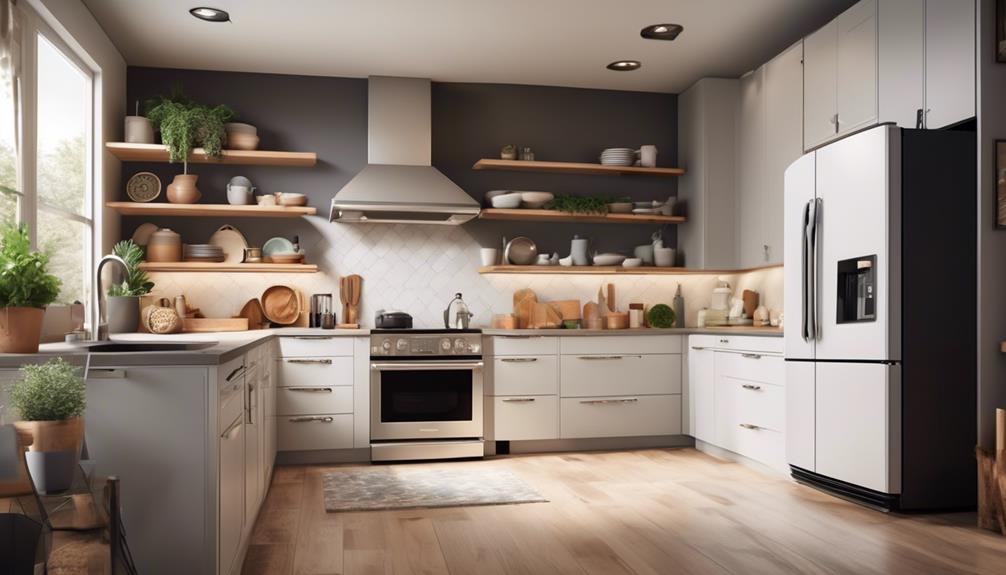
One of the key advantages of home appliances is their ability to streamline daily tasks and improve efficiency in household management. The impact of home appliances on daily life can't be overstated, as they play a crucial role in simplifying our routines. By automating various chores such as laundry, dishwashing, and food preparation, these appliances free up valuable time that can be better spent with family or pursuing personal interests. Additionally, the convenience they offer is unparalleled, as they enable us to accomplish tasks with minimal effort and intervention.
Furthermore, home appliances contribute to significant cost savings over the long term. Energy-efficient models help reduce utility bills, while modern appliances are designed to minimize water usage, resulting in lower expenses. Moreover, the time saved by utilizing these appliances can lead to increased productivity or the opportunity to take on additional work, ultimately boosting one's income. In essence, the benefits of home appliances extend beyond mere convenience, impacting both the quality of daily life and financial well-being.
Challenges in Home Automation
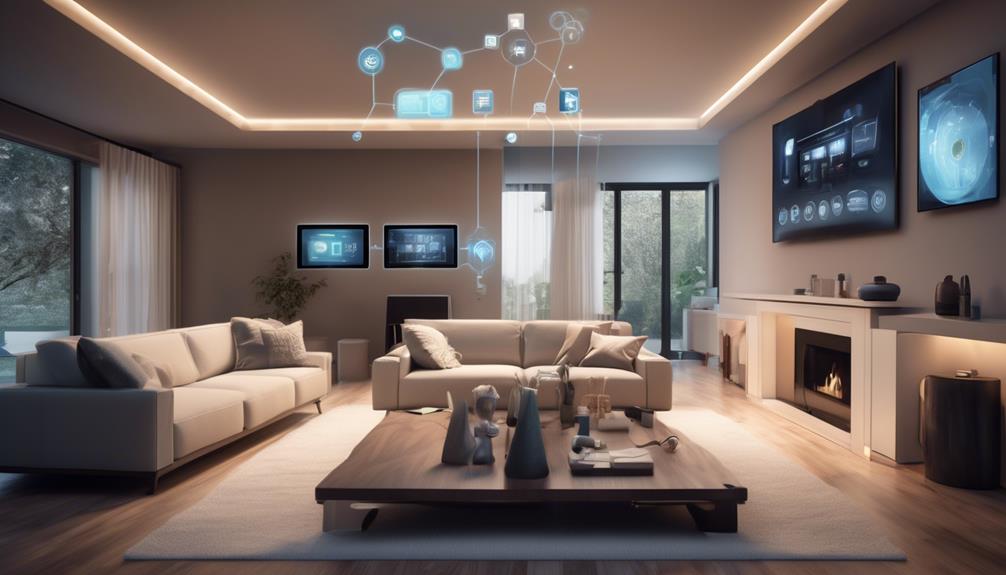
As we delve into the realm of home automation, we encounter various challenges that necessitate careful consideration and strategic planning. The implementation of home automation systems presents several hurdles that need to be addressed for successful integration and optimal user experience enhancements.
Some of the primary challenges include:
- Interoperability: Ensuring seamless communication and integration among different devices and protocols within a home automation ecosystem can be complex. Compatibility issues may arise when attempting to connect devices from various manufacturers, requiring standardized protocols and interfaces.
- Security Concerns: With the increasing interconnectedness of devices, the vulnerability to cyber threats and privacy breaches becomes a critical implementation issue. Robust security measures are imperative to safeguard personal data and prevent unauthorized access to the home automation system.
- Technological Advancements: The rapid pace of technological advancements poses a challenge in ensuring that home automation systems remain up-to-date and adaptable. Integrating emerging technologies while maintaining compatibility with existing infrastructure requires careful planning and proactive adaptation strategies.
Addressing these challenges is essential for the successful implementation of home automation, ultimately leading to improved user experience enhancements and the realization of the full potential of smart home technology.
Future of Home Automation
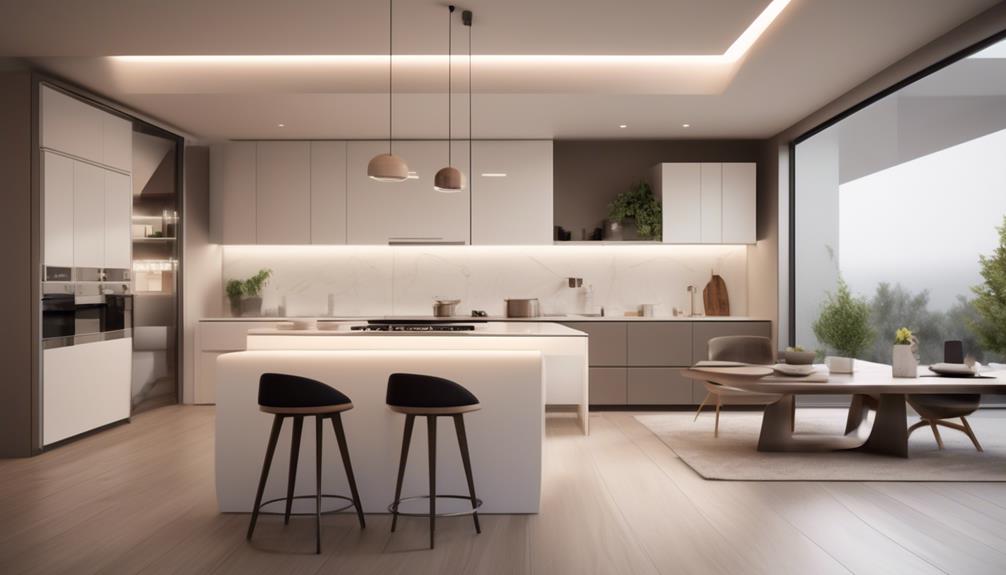
Navigating through the challenges of home automation, we anticipate a future where seamless integration, robust security, and adaptability are key components driving the evolution of smart home technology. Future trends in the home automation industry point towards even greater connectivity and convenience. As technology advancements continue, we foresee a surge in consumer adoption of smart home devices, leading to substantial market growth within the smart home ecosystem.
The integration of Internet of Things (IoT) technology will play a pivotal role in shaping the future of home automation. This interconnected network of devices will enable automation in everyday life, from managing energy consumption to enhancing security and optimizing household tasks. With IoT integration, smart homes will become more intuitive and responsive to the needs and preferences of residents.
Furthermore, the home automation industry is poised to witness a shift towards more personalized and adaptive solutions. As automation technologies become more sophisticated, homes will be able to learn and anticipate the habits and requirements of their occupants, providing a truly tailored living experience.
The future of home automation is bright, with innovation driving towards a more interconnected, intelligent, and efficient living environment.
Frequently Asked Questions
Can Home Automation Be Integrated With Existing Home Security Systems?
Yes, home automation can be integrated with existing home security systems. Smart technology allows for seamless integration, enhancing home safety.
Automation compatibility enables the incorporation of security measures within the home automation system. This integration provides a comprehensive approach to safeguarding the home, offering convenience and peace of mind.
What Are Some Common Misconceptions About Home Appliances and Home Automation?
Misconceptions about home automation and appliances can lead to confusion.
People often think home automation is just about fancy gadgets, but it's more about convenience and efficiency.
On the other hand, some believe appliances are solely for basic tasks, overlooking their potential for streamlining daily routines.
Understanding these misconceptions is crucial to reap the benefits of automation while being aware of potential drawbacks such as cost and complexity.
How Does Home Automation Impact Energy Efficiency in a Household?
In our household, home automation has had a significant impact on energy efficiency.
It has led to cost savings through the optimization of energy usage and reduced environmental impact by minimizing our overall energy consumption.
Additionally, it has brought convenience and lifestyle changes by allowing us to remotely control and monitor our home appliances, ensuring that they operate efficiently and only when needed.
Are There Any Potential Privacy Concerns With Using Home Automation Systems?
Potential privacy concerns arise with home automation systems, raising questions about data security. It's crucial to assess the risks and implement robust measures to safeguard personal information.
As we delve into the complexities of these systems, understanding the implications of sharing data with various devices becomes paramount. Mastering the intricacies of data security in home automation ensures a proactive approach to addressing potential privacy concerns.
What Are Some Examples of Advanced Home Automation Technologies That Are Not Widely Known?
Innovative gadgets and smart devices are revolutionizing home automation. From advanced voice-controlled assistants to cutting-edge security systems, the range of sophisticated technologies is vast.
These include intuitive climate control systems, advanced energy management solutions, and personalized health monitoring devices. These innovations represent the forefront of home automation, promising to enhance convenience, efficiency, and comfort in ways not widely known.
How Does Home Automation Differ from Home Security and Home Appliances?
Home automation and home security have their own unique purposes. While home security focuses on safeguarding your property and loved ones, home automation encompasses a broader spectrum, aimed at enhancing comfort and convenience in your living space. On the other hand, home appliances are physical machines and gadgets that facilitate everyday tasks, providing ease in various household chores. The key difference between home security and home automation lies in their core objectives, with home automation offering a more comprehensive and personalized experience.
Conclusion
In conclusion, home automation and home appliances both offer convenience, but home automation takes technology to the next level.
With the ability to control and monitor various systems in the home, home automation provides personalized and efficient solutions.
While home appliances focus on specific tasks, home automation encompasses a wide range of functions, making it the future of smart living.
Embracing this evolution will elevate everyday living, leading to a more seamless and sophisticated lifestyle.
- About the Author
- Latest Posts
Introducing Ron, the home decor aficionado at ByRetreat, whose passion for creating beautiful and inviting spaces is at the heart of his work. With his deep knowledge of home decor and his innate sense of style, Ron brings a wealth of expertise and a keen eye for detail to the ByRetreat team.
Ron’s love for home decor goes beyond aesthetics; he understands that our surroundings play a significant role in our overall well-being and productivity. With this in mind, Ron is dedicated to transforming remote workspaces into havens of comfort, functionality, and beauty.
Smart Home Automation
Can Smart Home Devices Be Hacked
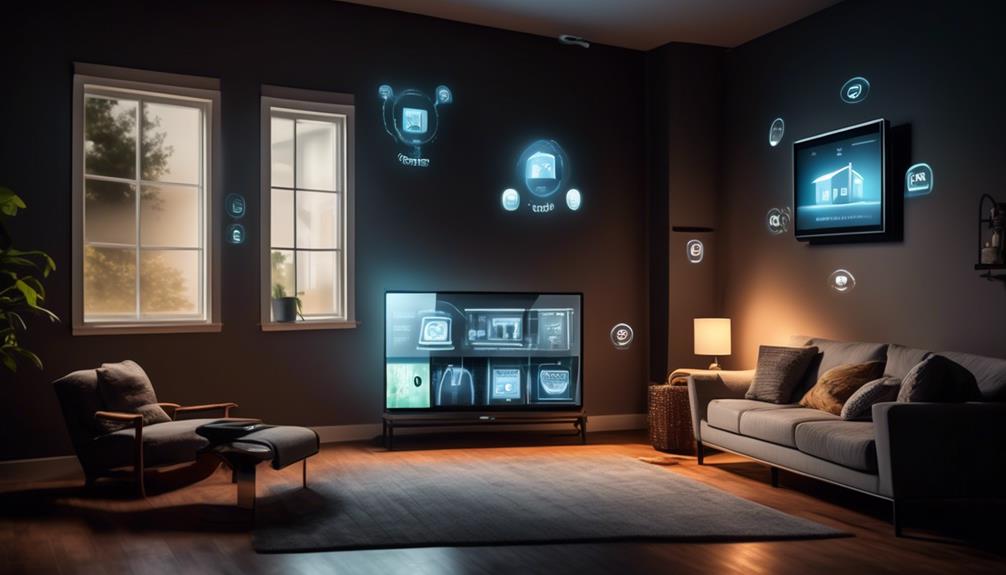
By chance, a lot of us depend on smart home gadgets to enhance the convenience in our lives. Nonetheless, it’s significant to take into account the possible security hazards linked to these devices.
As we continue to integrate smart technology into our homes, the question arises: can smart home devices be hacked? In this discussion, we'll explore the vulnerabilities of smart home devices, common hacking methods, the risks associated with compromised devices, and measures to protect our smart homes from cyber threats.
It's crucial to understand the implications of smart home hacking on our privacy and take proactive steps to secure our networks and devices.
Key Takeaways
- Smart home devices are vulnerable to hacking due to weak communication protocols and lack of secure encryption and firmware updates.
- Hacked smart home devices pose various risks, including privacy breaches, financial vulnerabilities, and safety concerns.
- Identity theft, fraudulent activities, and financial vulnerabilities can occur when hackers gain access to personal and financial information through smart home devices.
- Smart home hacking can have a significant impact on privacy, leading to data breaches, surveillance risks, and invasive monitoring.
Understanding Smart Home Vulnerabilities
Smart home vulnerabilities can expose our private data and leave our homes open to unauthorized access by hackers. Ensuring smart home data protection is critical to safeguarding our privacy and security. Cybersecurity measures for smart homes are essential to mitigate the risks associated with interconnected devices.
One key vulnerability lies in the communication protocols used by smart devices. Many devices rely on Wi-Fi or Bluetooth for connectivity, which can be exploited by hackers if not properly secured. Implementing strong encryption and regularly updating firmware are crucial steps to bolster smart home data protection.
Furthermore, the proliferation of IoT devices introduces a larger attack surface for potential hackers. Each connected device represents a potential entry point for cyber threats. Therefore, it's imperative to segment the network and establish strong access controls. Additionally, the use of strong, unique passwords for each device and enabling two-factor authentication can significantly enhance cybersecurity for smart homes.
Understanding these vulnerabilities is paramount for individuals seeking to protect their smart homes. By proactively addressing these vulnerabilities through robust cybersecurity measures, we can better safeguard our private data and ensure a more secure smart home environment.
Common Hacking Methods for Smart Devices
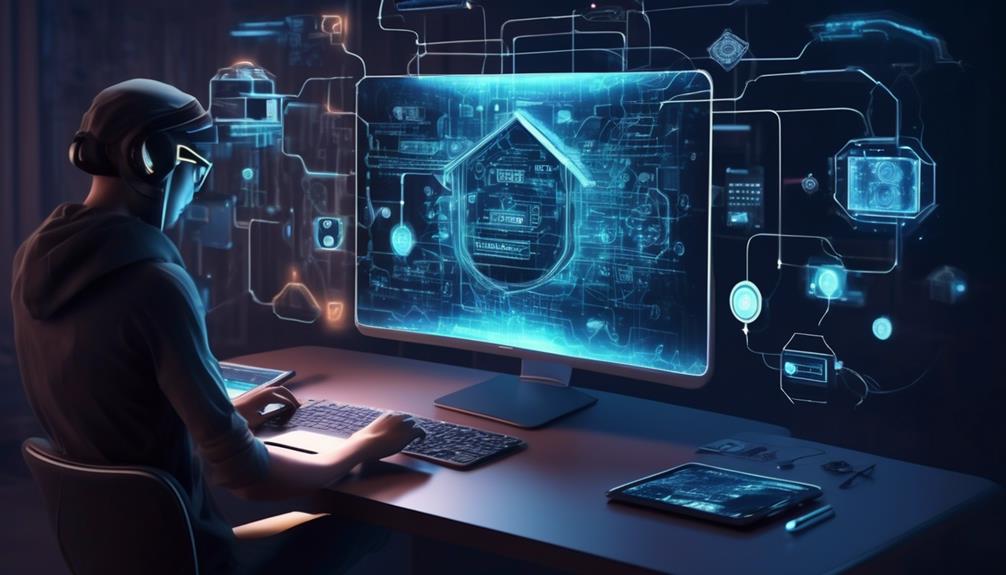
When it comes to hacking smart home devices, vulnerabilities in software are a major concern. Default passwords pose a significant risk, as many users fail to change them, leaving their devices open to exploitation.
Additionally, phishing attacks targeting smart devices are becoming increasingly common, making it crucial for users to be vigilant about their online security.
Vulnerabilities in Software
How can hackers exploit vulnerabilities in smart home device software to gain unauthorized access and control over the devices?
Vulnerabilities in software can be exploited through various methods, including:
- Software patching: Failure to update the device's software with the latest patches and security updates can leave it vulnerable to known exploits.
- Vulnerability assessment: Hackers can use automated tools to scan for weaknesses in the software and exploit any identified vulnerabilities.
- Insecure coding practices: Developers may inadvertently introduce vulnerabilities through poor coding practices, such as not validating user input or using outdated encryption methods.
- Default credentials: Smart devices often come with default login credentials that users fail to change, making it easy for hackers to gain access.
- Third-party integrations: Vulnerabilities in third-party apps or services that integrate with smart home devices can also be exploited to compromise the devices.
Default Passwords Risk
By failing to change default login credentials on smart home devices, users inadvertently create an easily exploitable entry point for hackers seeking unauthorized access and control.
Default passwords like 'admin' or '1234' are well-known and frequently targeted by hackers. These default passwords are often shared across multiple devices of the same brand, making it easier for attackers to gain access to a wide range of smart home products.
This emphasizes the critical importance of password management and security awareness among smart device users. To mitigate the risk of unauthorized access, users should immediately change default passwords upon setting up their smart home devices. Additionally, adopting strong, unique passwords for each device and implementing two-factor authentication can significantly enhance the security posture of smart home ecosystems.
Security awareness and proactive password management are essential in safeguarding against potential breaches.
Phishing Attacks Potential
Users' failure to change default login credentials on smart home devices not only poses a risk for unauthorized access, but also opens the door to potential phishing attacks, which are common hacking methods for smart devices.
Phishing attacks involve tricking users into revealing personal information, such as login credentials or financial details, through deceptive means. When it comes to smart devices, phishing attacks can be particularly devastating as they can provide hackers with direct access to a user's home network and personal data.
To prevent falling victim to phishing attacks, users should be aware of the following:
- Implementing two-factor authentication
- Verifying the sender's email address
- Avoiding clicking on suspicious links
- Being cautious of urgent or alarming messages
- Regularly updating security software
Risks Associated With Hacked Smart Home Devices
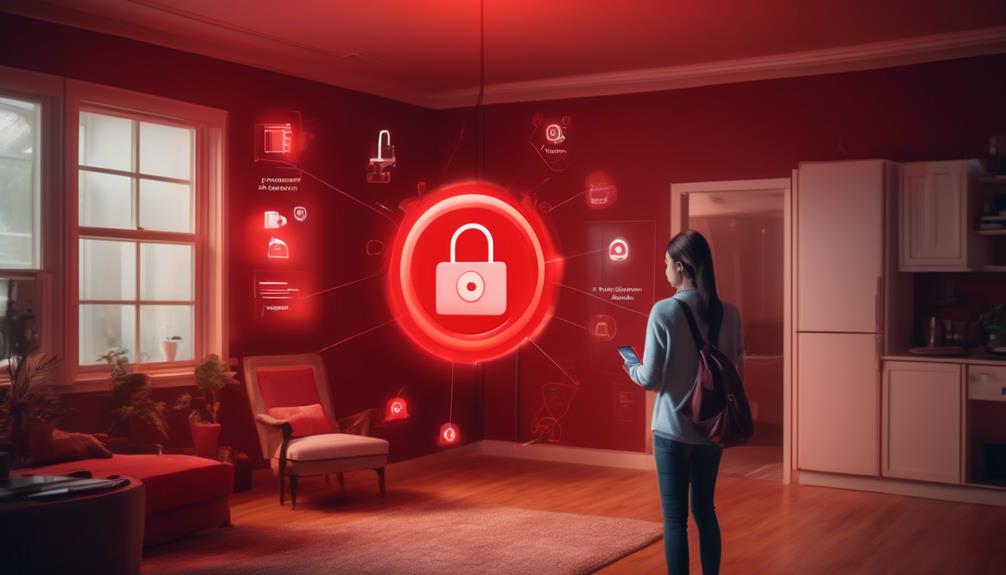
When smart home devices are hacked, privacy risks become a major concern as personal information and activities can be accessed by unauthorized individuals.
Financial vulnerabilities also arise, as hackers may exploit connected payment systems or gain access to sensitive financial information.
Safety concerns come into play as well, as compromised smart home devices can potentially lead to physical harm or property damage.
Privacy Risks
Smart home devices, when compromised by hackers, can lead to significant privacy risks for homeowners, potentially exposing personal information and activities to unauthorized individuals.
The privacy implications of hacked smart home devices include:
- Unauthorized Surveillance: Hackers can gain access to cameras and microphones, allowing them to spy on the homeowner's activities.
- Data Breaches: Personal data such as schedules, routines, and even sensitive information like credit card details can be stolen.
- Physical Security Breach: Access to smart locks and security systems can compromise the safety of the home.
- Location Tracking: Hacked devices can reveal the homeowner's whereabouts, posing a risk to their physical security.
- Identity Theft: Personal information stored on the devices can be used for identity theft and other fraudulent activities.
It's crucial for homeowners to be aware of these risks and take proactive measures to secure their smart home devices.
Financial Vulnerabilities
Exposing the financial vulnerabilities associated with hacked smart home devices requires a comprehensive understanding of the potential risks and their implications for homeowners.
When smart home devices are compromised, the financial security of homeowners is at stake. Hackers gaining access to personal data through these devices can lead to identity theft, unauthorized access to financial accounts, and fraudulent activities.
Moreover, compromised smart home devices can be used to gather sensitive financial information, such as banking credentials or credit card details, putting homeowners at significant risk.
The financial implications of such breaches can be severe, resulting in financial loss and damage to credit scores.
Therefore, ensuring the security of smart home devices is crucial for safeguarding the financial well-being of homeowners and protecting their personal data.
Safety Concerns
To comprehend the safety concerns related to hacked smart home devices, it's imperative to assess the potential risks and their impact on homeowners' security. Smart home device vulnerabilities can pose significant threats, including unauthorized access to personal data, surveillance, and physical safety risks.
The following cybersecurity measures for smart homes are essential to mitigate these risks:
- Regular software updates for all smart devices to patch vulnerabilities.
- Strong encryption methods to protect data transmission and storage.
- Implementation of multi-factor authentication to prevent unauthorized access.
- Network segmentation to isolate smart devices from critical systems.
- Continuous monitoring of network traffic for any unusual activities or potential breaches.
These measures are crucial in safeguarding smart homes against the growing threats of cyber attacks and ensuring the safety and security of homeowners.
Impact of Smart Home Hacking on Privacy

With the increasing prevalence of smart home devices, the potential for privacy breaches through hacking has become a significant concern for homeowners and technology users.
Data breach implications and surveillance risks are two critical aspects of the impact of smart home hacking on privacy. In the event of a smart home device being hacked, sensitive personal data such as daily routines, security camera footage, and even conversations could be compromised, leading to severe privacy violations. The implications of such a data breach are far-reaching, as cybercriminals could exploit this information for identity theft, burglary, or even blackmail.
Moreover, the constant surveillance capabilities of smart home devices make them particularly susceptible to hacking, posing significant risks to individuals' privacy. Unauthorized access to live camera feeds or recorded footage can result in invasive monitoring, causing emotional distress and a profound breach of privacy.
As smart home technology continues to advance, it's crucial for users to prioritize cybersecurity measures to safeguard their privacy and mitigate the potential impact of smart home hacking.
Protecting Your Smart Home From Cyber Threats
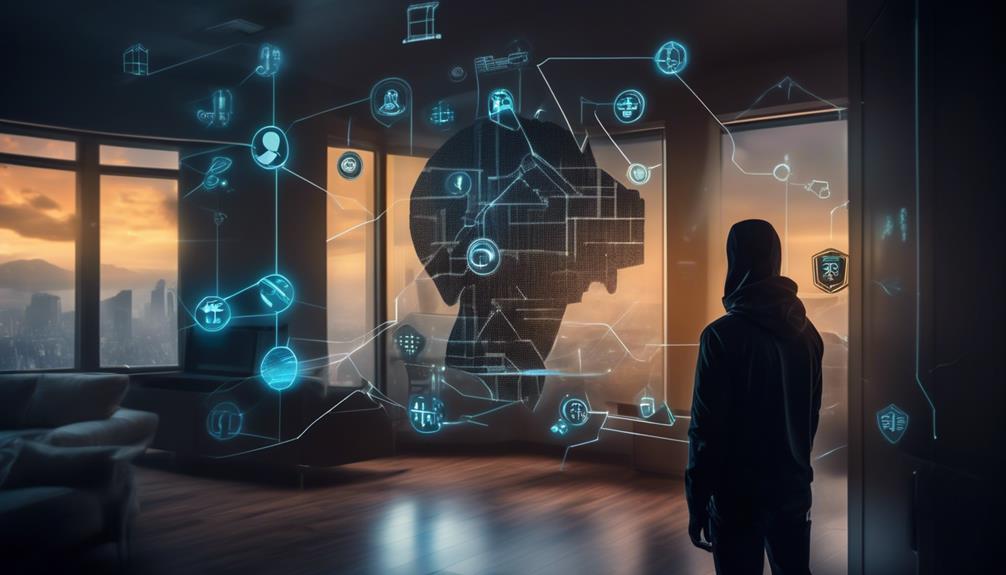
The potential for privacy breaches through hacking underscores the critical need for proactive measures to protect our smart homes from cyber threats. As homeowners, we must be vigilant in safeguarding our connected devices and networks.
Here are some essential strategies to enhance the security of our smart homes:
- Smart Home Device Encryption: Ensure that all smart home devices are equipped with robust encryption protocols to protect data from unauthorized access.
- Strong Password Management: Implement complex, unique passwords for each smart device and regularly update them to mitigate the risk of unauthorized access.
- Network Segmentation: Separate IoT devices from the primary home network to contain potential breaches and prevent unauthorized access to sensitive data.
- Regular Software Updates: Stay proactive in updating the firmware and software of smart devices to patch any known vulnerabilities and enhance overall security.
- Cybersecurity Awareness for Homeowners: Educate ourselves and our family members about potential cyber threats, phishing scams, and best practices for maintaining a secure smart home environment.
Potential Consequences of Smart Home Breaches
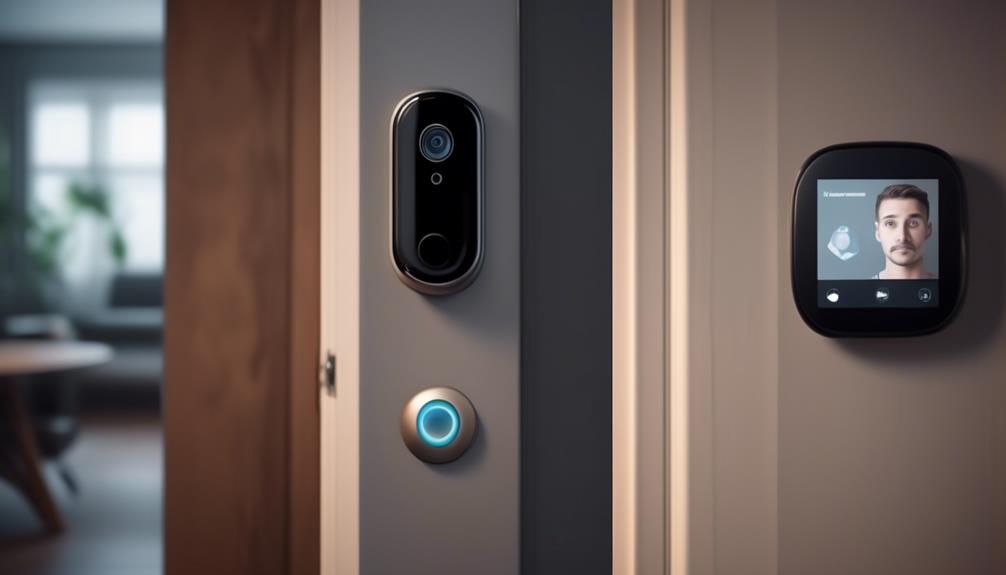
Experiencing a smart home breach can lead to significant financial, privacy, and safety repercussions, highlighting the critical importance of implementing robust cybersecurity measures. The consequences of a breach can be dire, ranging from financial loss due to theft of personal and financial information, to invasion of privacy through unauthorized access to cameras and microphones.
Moreover, compromised smart home systems can pose significant safety risks, such as unauthorized access to security cameras or the ability to manipulate smart locks. These breach impacts underscore the necessity of prioritizing risk management and implementing proactive security measures.
Financially, the aftermath of a smart home breach can be devastating, with potential theft of banking details, credit card information, and identity theft leading to substantial monetary losses. Furthermore, the invasion of privacy resulting from unauthorized access to personal data can have lasting psychological and emotional effects.
Safety is also compromised as hackers may exploit vulnerabilities to gain access to critical systems, posing risks to both property and personal safety. To mitigate these potential consequences, it's imperative to invest in robust security measures and stay abreast of evolving cybersecurity threats.
Securing Smart Home Networks and Devices
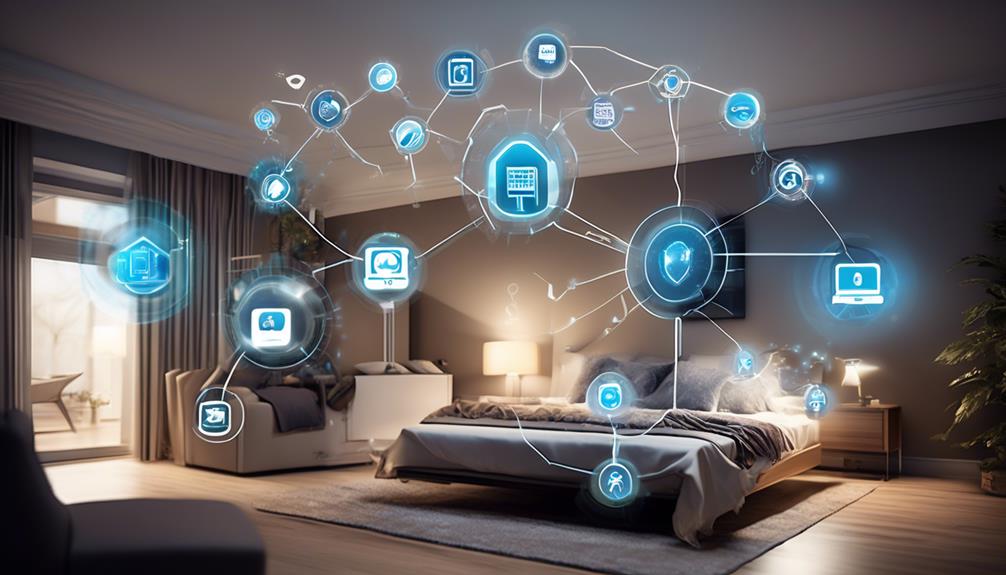
When it comes to securing smart home networks and devices, there are several crucial points to consider.
Implementing device security measures, such as strong passwords and two-factor authentication, is essential in safeguarding against unauthorized access.
Additionally, utilizing network encryption protocols and staying vigilant about firmware updates and patches are key practices to enhance the security of smart home systems.
Device Security Measures
Securing smart home networks and devices requires implementing robust encryption protocols and regularly updating firmware to mitigate potential vulnerabilities. To enhance device security, it's crucial to consider the following measures:
- Physical security: Protect devices from unauthorized physical access by placing them in secure locations and using locks or biometric authentication.
- Behavioral patterns: Monitor and analyze users' behavioral patterns to detect any abnormal activities that may indicate unauthorized access.
- Network segmentation: Separate smart home devices into different network segments to limit the impact of a potential breach.
- Multi-factor authentication: Implement multi-factor authentication to add an extra layer of security beyond passwords.
- Regular audits: Conduct regular security audits to identify and address any weaknesses in the smart home network and devices.
Network Encryption Protocols
To fortify the security of smart home networks and devices, we must now turn our focus to the implementation of robust network encryption protocols.
Network encryption vulnerabilities pose a significant risk to smart home devices, potentially exposing sensitive data and leaving devices susceptible to unauthorized access.
The impact of weak network security on smart home devices can be profound, leading to privacy breaches, unauthorized control of devices, and even the possibility of malicious attacks on the entire network.
Utilizing strong encryption protocols such as WPA3 for Wi-Fi networks and implementing VPNs for remote access to smart home systems are potential solutions to mitigate these risks.
It's imperative for users to stay abreast of the latest encryption standards and ensure that their smart home devices are utilizing the most secure network encryption protocols available.
Firmware Updates and Patches
Firmware updates and patches play a crucial role in enhancing the security of smart home networks and devices. These updates are essential for addressing vulnerabilities and strengthening cyber defense against potential attacks.
Here are some key security implications to consider when it comes to firmware updates and patches:
- Vulnerability mitigation: Regular updates help in addressing known security flaws and weaknesses in the device's firmware.
- Enhanced protection: Patches often include security enhancements that fortify the device against emerging cyber threats.
- Improved performance: Updates not only enhance security but also optimize the device's functionality and performance.
- Risk reduction: Timely patches reduce the risk of exploitation by cybercriminals, safeguarding the smart home network and devices.
- Compliance adherence: Firmware updates ensure that the devices remain compliant with the latest security standards and regulations.
Recognizing Signs of Smart Home Hacking
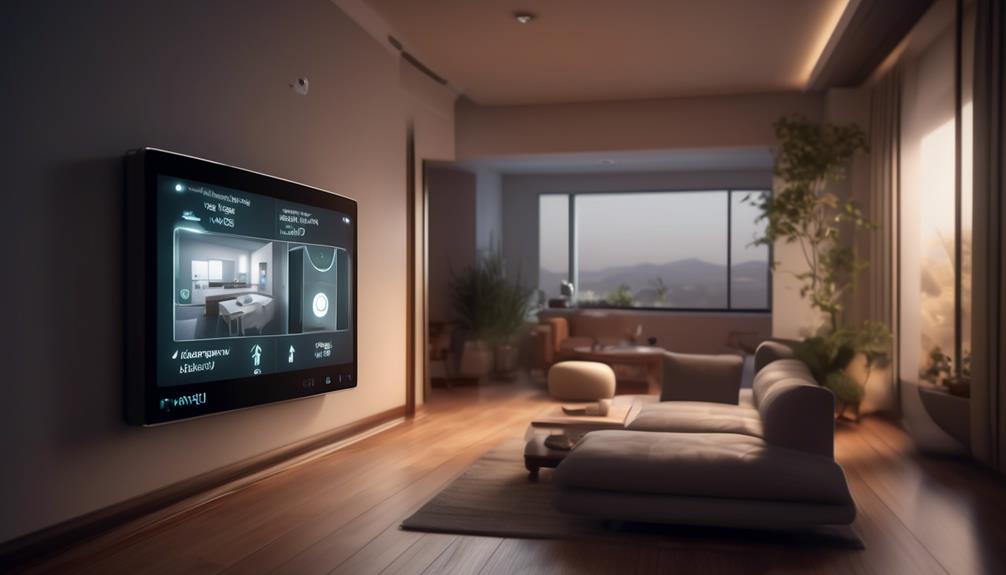
Monitoring your smart home devices for unusual behavior is crucial in detecting potential signs of hacking. Detecting intrusion attempts and responding to suspicious activities are essential for maintaining the security of your smart home.
One of the first signs of a potential hack is noticing unexplained changes in your smart home device settings or behavior. This could include lights turning on and off by themselves, sudden temperature changes on your thermostat, or unexplained sounds coming from your smart speakers.
Additionally, if you notice unfamiliar devices connected to your network or if your internet bandwidth is being used excessively, it could be an indicator of unauthorized access to your smart home system.
Another sign to watch out for is unusual network activity. If you observe unexpected outgoing network traffic or if your network slows down inexplicably, it could suggest that your smart home devices are compromised.
Furthermore, being alert to unrecognized login attempts or notifications from your smart home security system can also be indicative of potential hacking.
Regularly reviewing your smart home device logs and keeping an eye on any alerts from your security system can help in identifying these signs early and taking appropriate action to secure your smart home.
Legal and Ethical Considerations for Hacked Devices
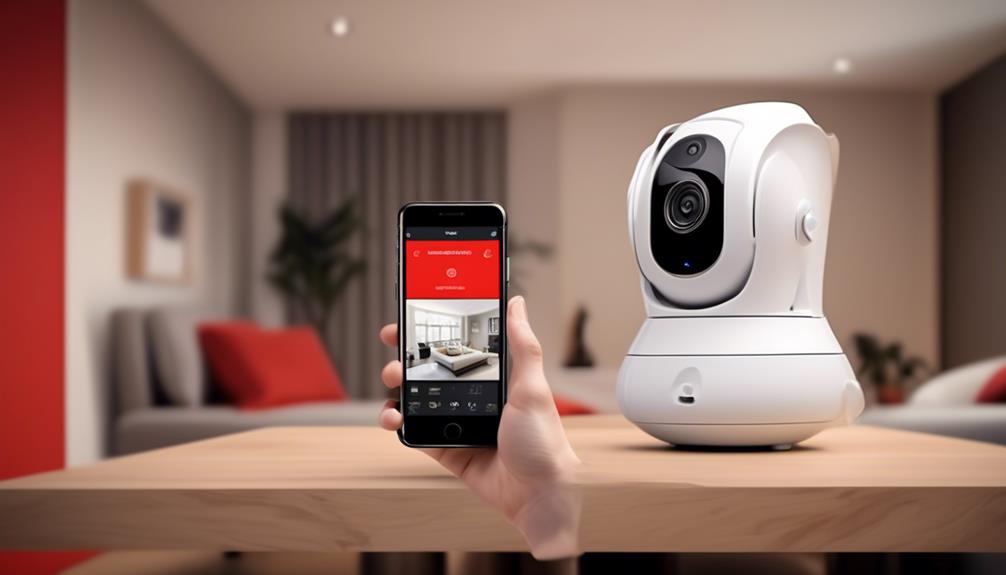
We must carefully consider the legal and ethical implications surrounding hacked smart home devices as they raise complex issues related to privacy, liability, and potential misuse of personal data.
- Privacy Concerns: Hacking smart home devices can lead to unauthorized access to private information, violating the privacy rights of individuals and families.
- Liability Issues: When a smart home device is hacked, determining liability becomes challenging. Manufacturers, software developers, and users may all be implicated, raising questions about who should be held responsible for the breach.
- Potential Misuse of Personal Data: Hacked devices can compromise sensitive personal data, which may be misused for identity theft, fraud, or surveillance, highlighting the importance of securing personal information in smart home systems.
- Regulatory Compliance: Legal implications involve complying with data protection laws, such as the General Data Protection Regulation (GDPR) in the European Union, and implementing security measures to prevent unauthorized access.
- Ethical Responsibilities: Companies and individuals have ethical responsibilities to safeguard the privacy and security of smart home users, necessitating transparent communication and robust security measures.
Future Trends in Smart Home Security
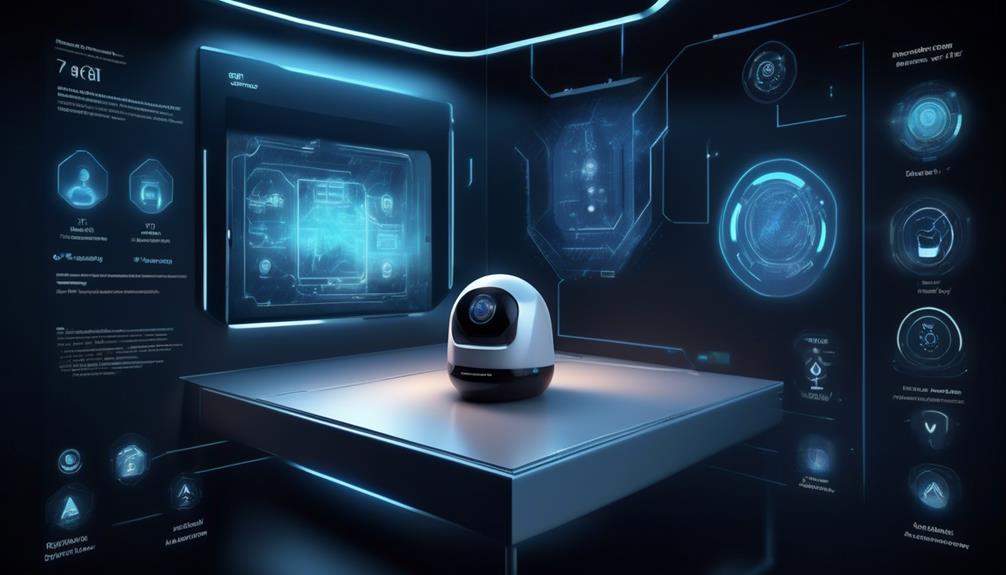
As technology continues to advance, the integration of artificial intelligence (AI) and machine learning algorithms into smart home security systems is poised to revolutionize the protection of connected homes.
Future advancements in smart home security will see AI and machine learning algorithms being leveraged to analyze vast amounts of data from various devices to detect abnormal patterns or potential security breaches. These technologies will enable proactive security measures, such as preemptive threat detection and automated response mechanisms, enhancing the overall safety of smart homes.
Moreover, the future of smart home security will also focus on addressing privacy concerns and data protection. Advanced encryption methods and secure communication protocols will be implemented to safeguard the privacy and integrity of the data transmitted between smart home devices and their control systems. Additionally, there will be an increased emphasis on user authentication and authorization processes to prevent unauthorized access to sensitive information.
Frequently Asked Questions
Can Smart Home Devices Be Hacked Remotely, or Does the Hacker Need Physical Access to the Device?
Smart home devices can be hacked remotely due to device vulnerabilities. However, some smart devices lack robust security measures, making them susceptible to remote attacks.
While physical access to the device may provide additional avenues for hackers, remote access is a common method for exploiting these devices.
To mitigate these risks, it's crucial to prioritize the security of smart devices, including implementing strong password protection, regular software updates, and network security protocols.
Are There Any Specific Smart Home Devices or Brands That Are More Vulnerable to Hacking?
Certainly, some smart home devices or brands are more vulnerable to hacking due to their security features and protocols. Preventive measures, such as regularly updating device firmware and using strong, unique passwords, can mitigate these vulnerabilities.
Vulnerable features include unencrypted communication protocols, weak authentication methods, and inadequate security patching.
It's crucial for users to stay informed about potential security risks and take proactive steps to secure their smart home devices.
How Can I Tell if My Smart Home Devices Have Been Hacked, and What Should I Do if I Suspect They Have Been?
When it comes to detecting hacking on smart home devices, it's crucial to stay vigilant. Monitoring network traffic and device behavior can reveal unusual patterns that may indicate a security breach.
Additionally, keeping software and firmware updated is essential. If hacking is suspected, immediately disconnect the device from the network and reset it to factory settings. Contact the manufacturer and change all associated passwords.
Regular security audits are also recommended to stay ahead of potential threats.
What Are the Potential Financial Implications of a Smart Home Device Being Hacked, Beyond Just the Cost of Replacing the Device?
When considering the potential financial implications of a smart home device being hacked, beyond replacing the device, it's crucial to address the potential legal implications. Implementing robust cyber security measures is essential to mitigate the risks associated with potential breaches.
Failure to address these concerns could result in significant financial liabilities, including legal fees, regulatory fines, and damage to one's reputation.
Maintaining a proactive approach to cyber security is imperative in protecting against these potential financial implications.
Are There Any Laws or Regulations in Place to Protect Consumers From Smart Home Hacking, and What Are the Legal Repercussions for Hackers Who Target Smart Home Devices?
Consumer protection and cybersecurity regulations play a crucial role in addressing smart home hacking. Legal repercussions for hackers targeting smart home devices vary, with penalties including fines and imprisonment.
Additionally, regulations such as the General Data Protection Regulation (GDPR) in the EU aim to protect consumer data and privacy. However, enforcement and specific laws regarding smart home hacking continue to evolve as technology advances.
– Can Smart Home Devices Create Security Risks?
Smart home devices solved have the potential to create security risks if not properly secured. Hackers can exploit vulnerabilities in connected devices, gaining access to personal information and even control over the home. It is important for homeowners to be aware of these risks and take necessary precautions to protect their smart home.
Conclusion
In conclusion, it's clear that smart home devices are vulnerable to hacking, posing serious risks to our privacy and security.
As technology continues to advance, it's important to stay vigilant and take necessary precautions to protect our smart homes from cyber threats.
By understanding the common hacking methods, securing our networks, and being aware of the signs of hacking, we can ensure a safer and more secure future for our smart homes.
Let's keep our homes smart, but also safe.
- About the Author
- Latest Posts
Introducing Ron, the home decor aficionado at ByRetreat, whose passion for creating beautiful and inviting spaces is at the heart of his work. With his deep knowledge of home decor and his innate sense of style, Ron brings a wealth of expertise and a keen eye for detail to the ByRetreat team.
Ron’s love for home decor goes beyond aesthetics; he understands that our surroundings play a significant role in our overall well-being and productivity. With this in mind, Ron is dedicated to transforming remote workspaces into havens of comfort, functionality, and beauty.
-

 Vetted5 days ago
Vetted5 days ago15 Best Fillers for Concrete Cracks – Expert Recommendations and Reviews
-

 Vetted7 days ago
Vetted7 days ago15 Best Plants for Large Pots to Transform Your Outdoor Space
-

 Vetted6 days ago
Vetted6 days ago15 Best Fairy Lights to Transform Your Space With Magical Illumination
-

 Vetted1 week ago
Vetted1 week ago15 Best Folding Beds for Small Spaces – Space-Saving Solutions for Comfort and Convenience
-

 Vetted1 week ago
Vetted1 week ago15 Best Waterproof Flooring Options for Your Bathroom – Ultimate Guide & Reviews
-

 Vetted2 weeks ago
Vetted2 weeks ago15 Best Grocery Carts to Make Shopping a Breeze
-

 Vetted23 hours ago
Vetted23 hours ago15 Best Subfloor Options for Your Basement Renovation – Ultimate Guide
-

 Vetted3 weeks ago
Vetted3 weeks ago15 Best Gravel for Driveway: The Ultimate Guide for a Durable and Stunning Entrance























